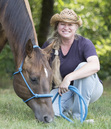Elena Hartwell's Blog, page 23
May 23, 2024
The Twisted Road: Historical Mystery Spotlight
The Twisted Road, a Barrister Perris Mystery by A.B. Michaels
Book & Author Info + an Excerpt
Don’t miss any blog tours! Click the link here.
The Twisted Road

Jonathan Perris Can’t Save His Clients …Until He Saves Himself
1907 Rising from the devastation of a massive earthquake and fire, San Francisco is once again on the move. But a strike by streetcar drivers threatens to halt the Golden City in its tracks. Protests turn to violence and violence leads to death. Soon a young guard is convicted of willfully killing a protester and the public is out for blood.
Jonathan Perris, an immigrant attorney from England, has opened a law firm with an eye toward righting wrongs, and the guard’s conviction may fall into that category. But the talented barrister soon finds his newfound career shaken by a tragic event: the gruesome murder of the beautiful and mysterious Lena Mendelssohn—a woman he’s been squiring around town. It’s difficult to run a law firm when you’ve been arrested for murder.
Book Details:
Genre: Historical Mystery
Published by: Red Trumpet Press
Publication Date: May 21, 2024
Number of Pages: 375
ISBN: 978-1-7337863-4-8 (Paperback) 978-1-7337863-0-0 (ebook)
Series: Barrister Perris Mysteries, Book 1
To purchase The Twisted Road click any of the following links: Amazon | Barnes & Noble | Kobo | Goodreads
Read an excerpt of The Twisted Road:
Chapter One
Bloody Tuesday
San Francisco
Turk Street Car Barn
May 7,1907
Nineteen years old, with the long, skinny limbs of a colt, Jimmy Walsh crouched behind a lamppost and shivered in the early morning fog. He dropped the brick he’d been clutching and hesitated before picking it up again. “This ain’t right,” he said, just loud enough for his nearest comrade in arms to hear. “It’s like waitin’ for Beelzebub to unleash his hounds of hell.” Several yards away, the wooden barn that housed the city’s electric trolley cars remained shuttered, but the sounds inside, muted through the mist, told him the show was about to begin.
Toke Griffin, a rock in one meaty hand, took a drag of his cheroot with the other. The smoke mixed with the fog, obscuring his leathered face. Two decades older than Jimmy, he was a union man from way back. This strike was nothing new. “Yeah, well them mutts are takin’ our jobs and we got to stop ’em any way we can.” He tossed the rock a few times and caught it. “They’re scabs and rotten to the core. We got to let them know it.” The gas-powered streetlight above Jimmy hissed, letting off sparks and a sulfurous belch. Toke barked in appreciation. “Even the damn lamp’s on our side.”
“Shut the hell up!” Another hiss—this one from a fellow striker, positioned behind one of the barbed wire barriers the scabs had set up to protect the cars. “You’ll give us away.”
Toke continued to grouse but lowered his voice. “Hell, you think they don’t know we’re out here? They’re chompin’ at the bit same as us.” He tossed his rock again. “But we got right on our side, just like old Davey and Goliath. You wait and see.”
Jimmy tried to swallow but couldn’t get passed his Adam’s apple. Lord, he wished he had some water or somethin’ else to calm the jitters taking over his body. Even his lucky red flannel shirt was no help. Why didn’t he keep the grub his mother had given him as he’d left that morning? She’d been up before him, knowing he had to go and not even trying to talk him out of it. “You keep your head down,” she warned as she handed him the bag with bread and cheese and a slice of apple cake in it. She’d even put in a mason jar full of cider.
“Sure, sure, Ma,” he’d told her, “Don’t worry about it. I’ll be fine.” Giving her a peck on the cheek, he’d headed out, but once around the corner, he’d ditched the bag, thinking it would look squirrelly bringing a lunch sack to a riot. What a damn fool.
It shouldn’t have come to this. It’d been over a year since the earthquake and fire had torn up the city, and the roads were still a tangled, busted-up mess. It was tricky driving the streetcars, and there were fewer drivers to boot. All the union wanted was an eight hour day and three bucks a shift. But United Railroads kept bickering with the city over repairs and used that excuse to refuse the union’s demands. What else could the carmen do but strike? Then the company brought in the Farleymen to drive the cars—four hundred of them! It stunk to high heaven and Toke had the right of it: they had to stop the scabs from taking their jobs.
The crowd outside the barricade was growing. Jimmy saw groups of Poles and Italians and Irish, even Chinese. They weren’t members of his union, but they were workingmen all the same, showing their support. That was labor for you, sticking together to get the job done. But there were also women and kids pouring out onto the street, like it was a parade or something! Thank God Ma had stayed home; he hoped his cousin was smart enough to keep her distance, too. This kind of ruckus was no place for females.
But damn if there weren’t plenty of ladies mixed in with everybody else, a lot of them young and fired up, itchin’ for a fight just like the men. He’d never admit it, but deep down, part of him admired their courage. Like Toke said, they were sticking up for what was right.
He was chewing on those thoughts when the big wooden doors on the barn began to slide open with a screech and the streetcars lumbered out, each driven by a scab, and each protected by several men with clubs and a guard with a rifle. The clock in the tower above the car barn soon started chiming the hour, but it was nearly drowned out by all the people screaming insults as they surged through an opening where the cars were supposed to leave the yard.
The strikers rushed by Jimmy, shoving him out of the way and already throwing whatever they’d been carrying—rocks and bricks and bottles—toward the scabs. Some strikers on the roofs pushed iron girders they must have got from construction sites; the beams hit the cars with a sickening clang.
Jimmy started to throw his brick, but stopped when he got a look at the second car and who was guarding it. Damnation, it was Emmett Barnes! That sonofabitch used to be a union man—not to mention Jimmy’s best friend—and now he was a hired gun for the Farleymen! He watched Emmett shoot his rifle into the air a few times, and his shots were answered by rooftop union men protecting the strikers on the ground. He couldn’t see Emmett’s face too well, but he bet his ex-friend wasn’t happy, especially since his shots hadn’t stopped the crowd from swarming around his car. Jimmy wasn’t part of that crowd; he couldn’t make himself move—like he was paralyzed or something—as he watched it all unfold.
A brick sailed through the air and hit Emmett in the face; he dropped down, and Jimmy couldn’t see him anymore. He glanced to his left and saw a man taking photographs of everybody. “Quit takin’ pictures!” Jimmy yelled at him. “Get out of the way—you’re gonna get hurt!”
More and more people began pushing Jimmy from behind, determined to stop the cars from running. He turned back to Emmett’s car and saw … and saw the rifle pointed toward the crowd from another angle. No, pointed right at him. Emmett? It couldn’t be. He wouldn’t do that, would he? He wouldn’t—
Jimmy Walsh started to put his head down like his ma had told him, but he wasn’t fast enough. He heard the crack of the rifle and felt the thump of the bullet hitting his skull. Then he felt nothing at all.
Chapter Two
A Tainted Case
San Francisco
June 1907
A barrister’s duty is to champion his client and seek justice in a court of law; when the client is guilty as sin, it complicates matters.
Jonathan Henry Perris rose to give his closing argument in the matter of the state of California vs. Horace Baxter. He faced the twelve men sitting in judgment before him.
“Gentlemen of the jury, you have already heard the facts of the case. My client, unfortunately, did shift money in relatively small amounts, from his firm’s accounts payable to his own savings account, over the course of several months. Those deposits did indeed line up chronologically with the amounts later deemed missing from the company’s ledger. It’s notable that Mr. Baxter, being the mathematical expert that he is, was precise in his recording, which speaks to his intent, as you shall see.
“That is the ‘what’ of this case and we shall stipulate that for the record. But the ‘why’ of Mr. Baxter’s actions is crucial and so, if you will indulge me, I would like to frame it within the context of the world in which each of us lives … a world comprised of three lives: one public, one private, and one secret.”
The prosecuting attorney looked comically befuddled. “Objection. What relevance does this have to the case before the court, Your Honor? Who cares why the defendant broke the law? The fact is, he broke it.”
Judge Cormer cocked his head toward Jonathan. “Mr. Perris?”
“I believe motive has much bearing on this case, your Honor. I will make my point as succinctly as possible, but you will see the relevance, I assure you.”
The judge scratched his beard. “Overruled, then. Proceed, Mr. Perris but do make it succinct.”
Jonathan turned back to his audience. “For example, I have come to know the public lives of many of you sitting here today. You are, generally speaking—” he said this with the hint of a smile, “— a reputable lot: a banker, a woolens merchant, a sheep rancher, to name a few. I too have a public persona. I am an immigrant, of course, but a respectable one, I hope. I am a trial attorney—what we would call a ‘barrister’ in England.” He extended his arms as if to display himself to the jury. He was wearing an impeccably tailored gray wool suit. “I bathe, I shave, and I dress suitably for my profession.
“But, like you, I also have a private life. I am not married and those who visit my abode might notice the lack of a woman’s touch.” He kept his rueful smile in place. “I indulge in perhaps more than the occasional whiskey, and I keep erratic hours because, unlike many of you, I have no one waiting for me.”
His tone began to harden. “Were I a fly on the wall in your homes, what would I witness, I wonder? Perhaps a perfect illustration of domestic bliss …” He leveled his gaze on specific members as he spoke. “… or perhaps not. My guess is that one or more of you enjoy your own favorite spirits to help you relax after a long day. Perhaps you drink too much, and your better half doesn’t like it. Maybe you get a thrill out of playing the ponies and you become despondent when you lose more money than you can afford. Maybe your temper runs hot, and your colleagues, not to mention your family members, have borne the brunt of it.”
Some individuals were becoming restive; a few looked decidedly uncomfortable, no doubt wondering where Jonathan was headed.
Certainly, Jonathan’s legal counterpart wondered. “Really, Your Honor? Is any of this relevant in the slightest to the matter at hand?”
Jonathan caught Judge Cormer’s warning look and forged ahead. “Ah, but then there is the secret life that many if not all of us lead.” His voice dropped. “Perhaps you find pleasure with those you shouldn’t be seen with … maybe an addiction has you in its grip. Or perhaps you’ve done something so nefarious and so perverse that no one, no one must ever learn about it.” He leaned toward the jury box. “What if I, for example, were a murderer? What if one of you were? None of us would ever know it because it’s a secret.” Jonathan let the last word linger.
“My client, Horace Baxter, led three lives, too. To the public he was an experienced adjustor for a respected insurance firm, in charge of determining the amount of payout for a given claim and reimbursing clients for their loss. His private life was relatively tame, with a harried wife and three boisterous young children, whom he adores.”
Jonathan now grew animated, as if to let the jurors in on salacious gossip. “But his secret life involved a woman. Not in the sense you would imagine. Not a voluptuous siren who would turn the head of any man. No, gentlemen. She was his much younger sister, a dear sweet girl, naïve in the ways of the world, whom he had protected his entire life. She had been led astray and become, of all things, an opium eater. She was not married and could not hold a job. The only way to pay for her habit was to prostitute herself.”
Jonathan glanced at his client. Horace Baxter was a hefty, florid man who was now slumped and staring at the table in front of him: a man mortified beyond the pale.
Days before, Jonathan had railed against the man who had lied to him and professed his innocence until discovery had proved him guilty on all counts. Only then had he explained his true reason for “cooking” the company books.
Jonathan sorely regretted taking the case, which he had done at the request of a colleague to whom he owed a favor. He wanted to believe he’d ignored his own instincts about the defendant, but in truth, he hadn’t picked up any warning signs until it was too late. He should have known better.
“You have ruined any chance for me to establish reasonable doubt,” he’d admonished his client. “For God’s sake, man, with so much on the line, you don’t keep such a secret from your attorney!” Jonathan had advised Baxter to throw himself on the mercy of the court by exposing all, but adhering to such a strategy didn’t make it any easier to stomach.
Jonathan now continued his argument. “Imagine yourself in Mr. Baxter’s shoes, gentlemen. Someone immeasurably close to you follows the wrong path and no matter how much you entreat them, harangue them, threaten them, cajole them, you cannot break the chain of dependence, a chain that has brought shame to your family—secretly—but at any moment could become public knowledge and lead to societal rejection and possibly the loss of your employment, resulting in economic ruin for you and your loved ones. It’s a conundrum, is it not?”
He singled out the banker, who flinched slightly under Jonathan’s gaze. “You have one recourse left, which is to find a discreet sanitarium where your beloved little sister can get help. Such a place costs money that you do not have. So, you devise a plan to obtain that money knowing in your heart that it’s wrong to embezzle but rationalizing that it’s a small amount compared to the company’s vast book of business, and that you will find a way, somehow, to pay it all back. You are so intent on doing that, moreover, that you keep precise records. Your plan is to, over time, replenish the account, claim a ‘slight miscalculation’ in the monies due and return those amounts to each client.
“The time comes when you have enough set aside to pay for the treatment, and you are about to send your sister away when a curious and astute co-worker finds something amiss.” Jonathan shrugged at the end of his tale. “And so you, like Mr. Baxter, might very well find yourself here today.
“I humbly ask you to consider the “why” of this case, gentlemen, in light of your own secrets, and show mercy on this man who did the wrong thing for the right reason. That is all.”
* * *
Ten days later, Jonathan returned to the central jail to have a final word with his client. Although Horace Baxter was found guilty, the jury had taken pity on him and recommended time served, along with a modest fine and of course, the return of the stolen monies. Baxter would have to find a new job, but at least he wouldn’t rot in a prison cell.
“You gonna break open the bubbly after getting your man out of jail?” The desk sergeant wanted to chat, but Jonathan was in no mood for it. He had a few parting words for his client and the sooner said the better. “That’s a capital idea, but I’m afraid more mundane duty calls. Have you got Mr. Baxter’s personal effects? I’ll take them to him.”
The sergeant handed Jonathan the bag and waved him through. “Well, don’t be modest. The state had him dead to rights, but you got him off light as a feather. You’re a silver-tongued devil, you are.”
Jonathan ignored the compliment as he made his way down the hall. “That’s not always a good thing,” he muttered.
Horace Baxter was pacing his cell, waiting to be let out, when Jonathan arrived, asking the guard if he could have a few moments of privacy with his client.
“Thank God this day has arrived,” Baxter said once the guard left. He donned his coat, buttoning it over his ample girth. “I’m ready.”
“Well, I’m not,” Jonathan said. “Sit down.”
“What?” Baxter frowned. “Is something wrong?”
Jonathan fought to keep his words—and his actions—under control. “You might say that. I’ve been in contact with your so-called sister.”
Baxter swallowed. “So … you’ve seen Franny? How … how did you—”
“Imagine my surprise when I called on your long-suffering wife to ask about your sister’s welfare, only to find out it’s her sister—sweet, young Francine— who’s taken to a life of prostitution because of her addiction. And when I found that not so sweet young girl, plying her trade on Stockton Street, it turns out she’s disappointed as hell that you aren’t going to get her the help she so desperately needs. So disappointed, in fact, that she let slip who was responsible for her predicament in the first place.”
The desperate look on Baxter’s face spoke volumes. “Wh—what did she say?”
“You know what she said. And you know the only reason she doesn’t share that information with her sister is that it would destroy your family.”
“You don’t understand. I mean … how tempting it was. I … I couldn’t help myself.” He hung his head, apparently bewildered by his own fall from grace.
“You couldn’t keep your pants buttoned around your wife’s sister—a member of your own family? And you did nothing when she began to escape her guilt through opiates?” Jonathan’s disgust was palpable. “You are a pathetic excuse for a human being, Mr. Baxter. You are the worst kind of bounder because you’re self-indulgent and you’re weak. The only reason I’m not exposing you is the same reason Francine suffers in silence.” Jonathan leaned in and lowered his voice. “But heed my words: if you go near that young woman again, I will personally see to it that you pay the price—and believe me, that price is much too high, even for a mathematical charlatan like you.”
“What’s going to happen to her?” Baxter whispered.
Jonathan rose to his full height. “That is no longer your concern. You focus on keeping your family fed, within the boundaries of the law.”
The two men said nothing more as Jonathan escorted Baxter out of the jail and into a waiting hansom cab.
Good riddance.
It was nearly noon and given his frame of mind, returning to his law office held no appeal. Jonathan considered inviting the woman he’d been seeing to an impromptu lunch, but quickly tabled the idea. Not only was Lena difficult to reach, but in truth he was in no mood to be sociable. Instead, he headed to a nearby watering hole and ordered one of the whiskeys he’d told the jury about. He thought about Francine and what she must have been like before she was betrayed by a brother-in-law she had no doubt looked up to and trusted. Tomorrow he’d find a way to help the young prostitute conquer her demons, but right now, more than anything, he needed to mask the bitter taste of setting a guilty man free.
***
Excerpt from The Twisted Road by A.B. Michaels. Copyright 2024 by A.B. Michaels. Reproduced with permission from A.B. Michaels. All rights reserved.
location/time/etc
Coming Soon!!
***
Excerpt from [Title] by xx. Copyright 2023 by xxx. Reproduced with permission from xxx. All rights reserved.
A.B. Michaels — Author of The Twisted Road
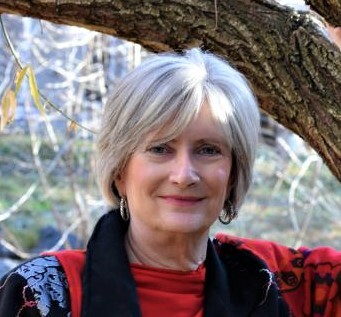 A native of California, A.B. Michaels holds masters’ degrees in history (UCLA) and broadcasting (San Francisco State University). After working for many years as a promotional writer and editor, she turned to writing the kind of page-turning fiction she loves to read. She writes historical fiction (“The Golden City” series, which takes place in Gilded Age San Francisco) as well as contemporary romantic suspense (“Sinner’s Grove Suspense.”). “Barrister Perris Mysteries” is her latest endeavor, based on characters introduced in “The Golden City.” All of her books are stand-alone reads. Michaels lives in Boise, Idaho with her husband and two elderly, four-legged “sons” (16 and 17!) who don’t seem to know they’re just dogs. She is an avid reader, traveler, quilter and bocce player, as well as a mediocre but enthusiastic golfer.
A native of California, A.B. Michaels holds masters’ degrees in history (UCLA) and broadcasting (San Francisco State University). After working for many years as a promotional writer and editor, she turned to writing the kind of page-turning fiction she loves to read. She writes historical fiction (“The Golden City” series, which takes place in Gilded Age San Francisco) as well as contemporary romantic suspense (“Sinner’s Grove Suspense.”). “Barrister Perris Mysteries” is her latest endeavor, based on characters introduced in “The Golden City.” All of her books are stand-alone reads. Michaels lives in Boise, Idaho with her husband and two elderly, four-legged “sons” (16 and 17!) who don’t seem to know they’re just dogs. She is an avid reader, traveler, quilter and bocce player, as well as a mediocre but enthusiastic golfer.
To learn more about A.B., click on any of the following links: ABMichaels.com, Goodreads, BookBub – @ABMichaels, Pinterest – @ABMichaelsBooks, Twitter/X – @ABMichaelsBooks & Facebook – @A.B.MichaelsWriter
Visit all the Stops on the Tour!
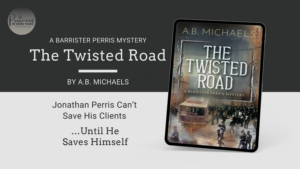
05/23 Hott Books
05/23 ashmanda. k
05/23 Books, Ramblings, and Tea
05/23 Country Mamas With Kids
05/23 Melissa As Blog
05/23 The Mystery of Writing
05/23 Wall-to-wall Books
05/24 fuonlyknew
05/24 Guatemala Paula Loves to Read
05/24 Literary Gold
05/25 Why Not? Because I Said So Book Reviews
05/28 Celticladys Reviews
05/28 Cozy Up With Kathy
05/28 Its All About the Book
05/28 Pat Fayo reviews
Elena Taylor/Elena Hartwell

Header image from Pixabay
The post The Twisted Road: Historical Mystery Spotlight appeared first on The Mystery of Writing.
May 21, 2024
The Shabti: A Debut Urban Fantasy
The Shabti, debut urban fantasy by Megaera C Lorenz
Author Interview + Book & Author Info + Author Pet Corner!Don’t miss any debut author interviews, click the link here for more.The Shabti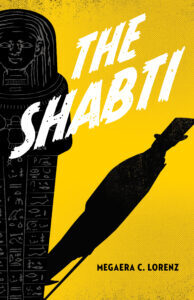 Can you flimflam a ghost?
Can you flimflam a ghost?
It’s 1934. Former medium Dashiel Quicke travels the country debunking spiritualism and false mediums while struggling to stay ahead of his ex-business partner and lover who wants him back at any cost. During a demonstration at a college campus, Dashiel meets Hermann Goschalk, an Egyptologist who’s convinced that he has a genuine haunted artifact on his hands.
Certain there is a rational explanation for whatever is going on with Hermann’s relics, Dashiel would rather skip town, but soon finds himself falling for Hermann. He agrees to take a look after all and learns that something is haunting Hermann’s office indeed.
Faced with a real ghost Dashiel is terrified, but when the haunting takes a dangerous turn, he must use the tools of the shady trade he left behind to communicate with this otherworldly spirit before his past closes in.
For readers who enjoy A Marvellous Light by Freya Marske, The House in the Cerulean Sea by TJ Klune, and Malice by Heather Walter
To purchase The Shabti, click on any of the following links: Amazon, Barnes & Noble, CamCat Books, Bookshop.org, Librio.fmInterview with Megaera C Lorenz, Author of The ShabtiThe Shabti is set in 1934. What drew you to that era and what did your research look like?I fell in love with the 1930s around the same time I fell in love with Egyptology, when I was 9 or 10 years old. It started when my parents rented a video of Betty Boop cartoons that included the trippy pre-Code masterpiece Minnie the Moocher, which features a very young Cab Calloway.
If you’ve never seen this cartoon, I urge you to look it up on YouTube. It’s wild. Young me was instantly hooked. My fascination with the cartoon—and with Cab Calloway—blossomed into a lifelong obsession with 1930s American popular music, cartoons, film, and history.
I especially adored the Universal monster movies of the 1930s growing up. I watched my favorite three—The Mummy, Bride of Frankenstein, and Dracula—countless times. I’ve always loved the idea of writing a story with the flavor of those films, set in that era. I wanted to create something with that same magical combination of glossy noir aesthetic, spooky thrills, romance, and camp/pulpiness.
My research, as far as the setting was concerned, involved a lot of work making sure the little period details were accurate. I pored over 1930s train schedules, hotel and restaurant menus, and even medical journals. I also combed through historical society and library archives for local details. I visited Hotel Baker and the Rainbow Room here in St. Charles several times to get a strong sense of place for the grand finale.
The Shabti centers on a former medium, Dashiel Quicke. Dashiel, now a nonbeliever, faces the supernatural. That’s a great twist! What drew you to writing about the paranormal?
I’ve always been intrigued by the uncanny. I think I first got really interested in Spiritualism and mediums when I read Spook by Mary Roach in my early 20s. For some reason, the phony mediums of the 19th and early 20th centuries fascinate and creep me out at least as much as the notion of real ghosts. I find the old spirit photographs and the pictures of mediums producing gauze ectoplasm and papier–mâché spirit faces to be incredibly eerie, even when they’re so obviously fake.
And of course, the supernatural and ancient Egypt are two great tastes that taste great together. The ancient Egyptians themselves had a long tradition of ghost stories, and they’ve been the subject of many modern tales of the paranormal. As I mentioned above, I grew up on movies like the original 1932 version of The Mummy, which of course had a major impact on the tone and themes of The Shabti.
I’d had the idea of writing a story about an Egyptologist haunted by a meddlesome ghost for ages, but it wasn’t until a few years ago that it really clicked for me that I could combine my interests in Egyptology and American Spiritualism to make something really fun and unique.
What else should readers know about Dashiel Quicke, the central character in The Shabti?
Dashiel was loosely inspired by a real person, M. Lamar Keene. Keene was a fraudulent medium—a very successful one, by his own account—who was mostly active in the 1960s. Eventually, he broke free of the business and worked to expose the shady tricks of the trade in the hopes that he could make amends and help prevent more people from being defrauded. His memoir/tell-all, The Psychic Mafia, was a vital source of information and inspiration to me when I was writing The Shabti.
Like Keene, Dashiel is a phony medium who eventually tires of the racket and decides to leave it behind. He’s dogged by guilt about his past, but he’s lived as a con artist for so long that he doesn’t really know how to do anything else. He’s deeply cynical about people in general and scornful of the notion that there’s any kernel of truth behind the tenets of Spiritualism.
But for all his cynicism and world-weariness, Dashiel has a lot of love to give, and there’s a core of goodness in him. When he finally finds someone he can trust, the bond that forms between them runs fierce and deep, and Dashiel is willing to do almost anything to protect him.
You are also an Egyptologist. Tell us about your interest and career in such a fascinating (and unusual!) subject:
The ancient Egypt bug bit me when I sat in on a World Civilization class at the University of Guam, where my parents were teaching at the time. I was about 9 years old. I was so passionate about becoming an Egyptologist that I enrolled at the University of Guam at age 13, determined to get into grad school as quickly as possible. After I’d exhausted all the relevant classes there, I transferred to Penn State to finish out my undergrad career under the tutelage of Egyptologist Donald Redford.
I went to grad school at the University of Chicago. During that time, I participated in fieldwork in Egypt and Sudan, worked in the ISAC museum at U. of C. as a curatorial assistant and educational consultant, and taught Egyptology classes at the graduate and undergraduate levels. I earned my PhD in Egyptology in 2017, with a focus on the history, language, and literature of the New Kingdom.
After that, I wandered off the path of academia. I still love ancient Egypt, but I feel most truly myself when I’m doing creative work. And I’m not the only Egyptologist to go down this route. The first woman to earn a PhD in Egyptology in the U.S.—another U. Chicago alum—went on to become beloved mystery author Elizabeth Peters. I’m proud to follow in her footsteps. One of my former U. of C. colleagues, Malayna Evans, also just debuted her first adult novel, Neferura, which is set in ancient Egypt during the reign of Hatshepsut.
Digital art is another interest of yours. What resonates for you with that art form?
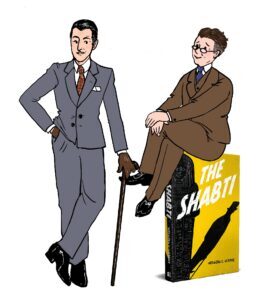
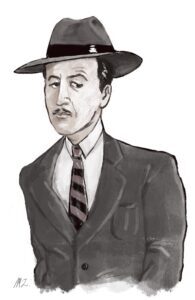 I love digital art because it’s so versatile. I can do things in Procreate on my iPad that I would struggle to ever pull off with traditional media. Bless whoever invented layers and clipping masks. But my digital art looks very traditional.
I love digital art because it’s so versatile. I can do things in Procreate on my iPad that I would struggle to ever pull off with traditional media. Bless whoever invented layers and clipping masks. But my digital art looks very traditional.
I mostly do pen-and-ink style drawings with flat colors or limited shading, but I’ve been experimenting with more painterly techniques.
These days, I draw lots of pictures of my characters. I did a series of portraits in a pseudo-1930s cartoon art style, but I’ve also attempted some more realistic renditions of them.
What are you working on now?
I’m writing a sequel/spin-off to The Shabti starring one of the secondary characters from the first book. She has a very different personality and voice from Dashiel’s, but I’m having so much fun with her. It’s another ghost story with a more traditional Gothic/haunted house vibe, but it has some interesting twists and turns that I’m excited about.
Words of Wisdom for Aspiring Writers:
Allow yourself to have fun. Write at least one book where you just cut loose and pour everything you love into it. I had such a fabulous time writing The Shabti, and the experience wouldn’t have been nearly as joyful if I hadn’t given myself permission to just be a big old earnest nerd about it all.
Author Pet Corner!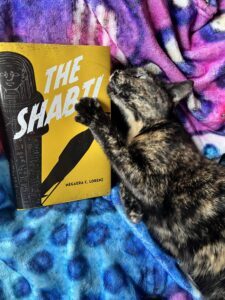 Nebi!
Nebi!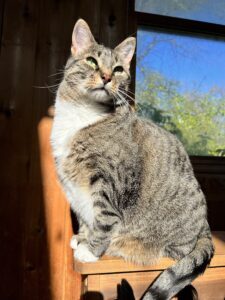 Sirius!
Sirius!I have two cats, Nebi and Sirius (don’t tell him he’s named after the Dog Star). Nebi is a delightfully weird little tortoiseshell who likes to be carried around on people’s shoulders.
Sirius is a big chonky goofball of a tabby, and he is the real-life model for Horatio, Prof. Hermann Goschalk’s cat in The Shabti.
 Max!
Max!I also have a Belgian Tervuren named Max. He’s a sweetheart, but he doesn’t know his own strength. He leaves a trail of chaos in his wake wherever he goes.
Megaera C Lorenz, Author of The Shabti
 Megaera Lorenz is an Egyptologist and professional tech writer/editor who is fascinated with all things odd and uncanny.
Megaera Lorenz is an Egyptologist and professional tech writer/editor who is fascinated with all things odd and uncanny.
After earning her Ph.D. from the University of Chicago in 2017, she decided to pursue her lifelong interest in creative writing.
She loves to craft stories that tap into her interests and expertise and combine them in strange and surprising ways.
She has lived in the Chicagoland area for nearly 20 years. Currently, she resides in St. Charles, IL with her family, which includes two kids, two cats, and a hyperactive Belgian Tervuren.
To learn more about Megaera, click on any of the following links: Website, Goodreads , Instagram, Threads, Bluesky, X/Twitter, Tumblr & TikTok Elena Hartwell/Elena Taylor

The post The Shabti: A Debut Urban Fantasy appeared first on The Mystery of Writing.
May 20, 2024
MIA: A New Crime Thriller
MIA, a crime thriller by John Lansing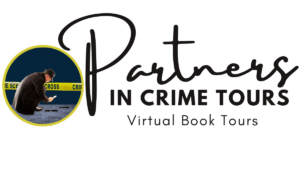
Excerpt + Book & Author Info!
Don’t miss any blog tour post! Click the link here.
MIA by John Lansing

Mia, is the origin story of retired inspector Jack Bertolino as a young undercover, NYPD narco-busting detective and his relationship with Mia, his confidential informant.
Mia, a former Miss Colombia, has the kind of beauty that can make a grown man contemplate leaving his wife, his job, and his kids. She’s a complex character, with a painful backstory, who signs on with Jack to help him infiltrate, and take down, a heavy hitter in the Colombian drug trade. Mia has ice water in her veins and is already responsible for delivering large amounts of cocaine, and millions of the cartels cash into the government’s coffers.
This is Jack and Mia’s story. How Mia became a confidential informant, her evolving relationship with Jack, and how the life and death case they brake wide open becomes the prequel to The Devil’s Necktie.
Book Details:
Genre: Crime Thriller
Published by: White Street Press/ Karen Hunter Publishing
Publication Date: 2024
Number of Pages: 252
ISBN: 979-8-9885166-3-7Series: The Jack Bertolino Series, Prequel
To purchase MIA, click on any of the following links: Amazon | Barnes & Noble | Goodreads
Read an excerpt of MIA:
Jack Bertolino’s early morning shower gave up the ghost long before he swiped his long-term pass to gain entry to the Staten Island Ferry. Once he landed in the City, he headed for Tango 23’s base of operations. There he picked up his NYPD plain-wrap sedan. The ninety-degree temperature, wetted by ninety-five degree humidity, made a mockery of the air conditioner in the Ford Crown Vic as it crawled through commuter traffic headed for LaGuardia. The air was thick, the stench of exhaust on the Grand Central Parkway overwhelmed as Jack dodged a pothole, rattled into the airport parking lot and came to an engine-clicking stop next to DEA agent Kenny Ortega’s government issue.
The joint narcotics task force case was in its sixth month. Jack had agreed to meet a few old friends and a new confidential informant who had arrived from Miami via Colombia. This CI claimed to be able to provide entry into the inner workings of Manuel Alvarez’s illicit drug operation.
Alvarez, a notorious Colombian trafficker, had been on Jack’s radar for more than a year. Alvarez was responsible for importing a thousand keys of cocaine into Miami on a monthly basis, and the poison
was dripping into New York City. Jack wanted Alvarez’s head on a pike.
At thirty-eight, Jack was already a lieutenant, the boss of the narco-rangers called Tango 23. His crew had great success shutting down drug and money-laundering cells in the five boroughs, piling millions of dollars of the cartel’s money into the city’s coffers.
Jack was a handsome, unpretentious man with thick dark hair he wore brushed back. Creases on his striking face were a roadmap of years exposed to the elements doing undercover narcotics work on the streets of New York City.
As he stepped out of the car, a hot gust of wind blew grit into Jack’s eyes and mouth. It also blasted the long hair of a young woman exiting the passenger side of Ortega’s vehicle, obscuring her face. The deafening sound of a wide-body jet thundered overhead as Jack spit and wiped his stinging eyes.
The woman hand-combed strands of blonde away from her face. When Jack’s vision cleared, he was momentarily stopped in his tracks. The woman was drop-dead gorgeous.
He nodded to Sal Traina, a member of the Tango group, and shook the hand of Mia Ferrero as Ortega made the introductions. Mia, an ex-Miss Colombia, was the confidential informant. Kenny Ortega, the Miami-based DEA agent, was Jack’s partner on the drug task force.
Nick Aprea, a detective from the LAPD narcotics division, had flown in from Los Angeles, where a large quantity of the illicit drugs ended up. He ducked low as he slid out of the back seat, wearing a black leather jacket in the New York heat, and led with a wolfish grin as he proffered a hand the size of a baseball glove. “Jack, good to be back in business.” Aprea was tall, hard, and took life as it came. He had arrived with serious skin in the game. A few years back, his partner had been gut-shot in an Alvarez–Delgado operation. Nick had put fifteen hundred keys of coke on the table, and his partner had been put in an early grave. When Jack invited him to the party, Nick jumped at the chance to deliver some retribution.
Mia signed on to the joint operation between the NYPD, Miami DEA, and LAPD to infiltrate Manuel Alvarez’s operation and help put away a
heavy hitter for the Colombian cartel. She was a proven commodity, already wealthy from delivering large quantities of cocaine and cash to the United States government’s coffers in their ongoing war on drugs. The Feds had a formula in place for paying informants. The bigger the bust, the larger the payoff. A nice way to fatten your wallet, an easy way to die.
Mia started playing Jack—who had a reputation of being a straight arrow—from the moment she touched down at LaGuardia Airport. She’d been summoned for a meeting downtown, organized to get a feel for the principals, define the case, and plan a strategy.
It was time to roll. Sal was sitting in the passenger seat of Jack’s car when Mia rapped on the window. Sal slid out, and Mia stepped in seconds before Jack pulled out of the lot.
“I hope you don’t mind. It was so crowded in the other car,” she said.
Jack wasn’t thrilled. “It’s okay,” he said, always careful when spending time with a CI. First of all, rules and parameters of the relationship had to be set in place, until the informant was proven trustworthy. Too many things could go wrong. Jack was career building and didn’t need any bullshit slowing him down. He had a line in the sand when dealing with informants, and although he always treated them with respect, sharing his personal life was a nonstarter.
Mia started talking rapid fire. Her English was lightly accented but flawless, and Jack chalked her excited banter to nerves.
“I wasn’t supposed to fly first class, but I used my frequent-flyer miles, and thank God because the plane was full, and I was in the air for so many hours. Should I call you Jack or Mr. Bertolino?”
“Lieutenant works.”
“Oh, very formal. It’s so hot in here,” Mia play-whined, and undid the second button on her blouse as she turned to face Jack. “Are you a by-the-numbers kind of guy?”
“Something like that.”
“I know a lot of Italians in Medellín. Not a formal one in the mix. Very sexy though, Italians in general, don’t you think?”
—
Jack kept his eyes trained on the traffic. “Never given it much thought.”
“Oh, I have. Very much so.”
Jack wasn’t going there. He hoped Mia would lose herself in the approaching view of the New York skyline and stop talking. Instead, she seemed content to stare at Jack who was growing increasingly uncomfortable, but didn’t want to get off on the wrong foot with a woman who could break his case wide open.
“And the police in general, what do they call it? Mucho testosterone. You can’t hide it, Jack—I mean, Lieutenant.” Mia’s smile was sly, and Jack kept his eyes on the road, not wanting the conversation to get out of hand.
“Your nose,” she said knowingly, “that must have hurt.”
Jack had a bump on his otherwise straight Roman nose. It was a gift from a crack dealer named Trey, who he traded punches with outside the Red Hook projects in Brooklyn. Trey went to jail, and Jack had a reminder every morning when he shaved to keep his right fist higher and jab with his left.
“Do you like sex on the beach?” Jack hoped she was talking about the cocktail and didn’t respond. “What about sex in the car?” Mia said and ran a manicured nail down his thigh. “I love giving blow jobs, I mean, giving oral sex.”
Jack shot a look in the rearview mirror, tried to remain stoic, but he was getting hot under the collar. He was doing sixty and Kenny Ortega’s car was tight on his bumper. Jack glanced in the rearview again, and saw the men in the trailing car laughing.
He’d had enough. He signaled and pulled the wheel hard to the right, sending Mia sliding against the passenger door. As horns around him started blaring, he skidded to a tire-screeching stop on the shoulder of the Brooklyn–Queens Expressway. He was followed by Ortega, Nick, and a few other smirking detectives in the second car.
Jack knew he’d been set up. He picked up the radio and raised Ortega. “Get this woman out of my car.”
Mia feigned being hurt. “Is it something I said?” Over the intercom, Ortega and his crew were howling. Mia jumped out of Jack’s car, her
face split into a sultry grin, and she winked. “Just having some fun, Lieutenant.”
Jack was the only one on the crew not laughing. He pulled back into traffic, riding solo, and dialed his home number.
Jeanine answered on the second ring. “Are you all right, Jack?”
“Huh?”
“An afternoon call. It’s usually bad news.”
“Oh, no, not today. Just wanted to hear your voice.”
“Hmmm, okay… Good.” Jeannine could read Jack’s mood and wasn’t buying it.
Jack started to relax, the earth rotating back on its axis. “Actually, I just made a pickup at LaGuardia, had a moment.”
“Okay. Are you going to make it home for dinner?”
“Don’t wait on me. We have a TAC meeting, breaking in a new informant. You know how that goes.”
Jeannine knew all too well what that meant. And Jack was hit with the familiar chill on the other end of the line. “Okay, Jack. Your son’s asking what happened to his father.”
“Tell him I miss him.”
“Tell him yourself, Jack,” Jeannine said quietly before hanging up the phone.
Jack stifled his growing anger, fully aware that he was an absentee father. From his point of view, he was building a secure life for his family, and they all had to make sacrifices. It was a team effort. He knew he was being defensive, but he also knew what it took to rise through the ranks of the NYPD.
Jack snapped out of it when Kenny beeped his horn and rocketed past in the fast lane. He rolled his eyes, slightly amused as Mia, sitting in the back seat, nailed him with a look that was purely X-rated.
***
Excerpt from MIA by John Lansing. Copyright 2024 by John Lansing. Reproduced with permission from John Lansing. All rights reserved.
MIA Author John Lansing
 John Lansing is the author of six thrillers featuring Jack Bertolino—The Devil’s Necktie, Blond Cargo, Dead Is Dead, The Fourth Gunman, 25 to Life, and MIA—as well as the true-crime non-fiction book Good Cop Bad Money, written with former NYPD Inspector Glen Morisano.
John Lansing is the author of six thrillers featuring Jack Bertolino—The Devil’s Necktie, Blond Cargo, Dead Is Dead, The Fourth Gunman, 25 to Life, and MIA—as well as the true-crime non-fiction book Good Cop Bad Money, written with former NYPD Inspector Glen Morisano.
He has been a writer and supervising producer on Walker, Texas Ranger, the co-executive producer of the ABC series Scoundrels, and co-wrote two MOWs for CBS. The Devil’s Necktie is in development at Andria Litto’s Amuse Entertainment, with Barbara DeFina attached as a producer.
A native of Long Island, John now resides in Los Angeles.
To learn more about John, click on any of the following links: JohnLansing.com, Goodreads, BookBub – @JohnLansing, Instagram – @johnlansingauthor, Twitter – @jelansing & Facebook – @devilsnecktie
Visit all the Stops on the Tour!

05/15 Showcase @ Books, Ramblings, and Tea
05/15 Showcase @ Celticladys Reviews
05/20 Showcase @ Archaeolibrarian – I Dig Good Books!
05/20 Showcase @ The Mystery of Writing
05/22 Showcase @ 411 ON BOOKS, AUTHORS, AND PUBLISHING NEWS
05/23 Review @ Mystery, Thrillers, and Suspense
05/24 Showcase @ Silvers Reviews
05/26 Review @ Book Reviews From an Avid Reader
05/30 Review @ Paws. Read. Repeat
05/31 Review @ Guatemala Paula Loves to Read
06/01 Review @ Because I said so
06/03 Review @ Why Not? Because I Said So Book Reviews
06/04 Review @ dianas_books_cars_coffee
06/05 Review @ Novels Alive
06/06 Review @ mokwip8991
06/07 Review @ Country Mamas With Kids
06/08 Review @ Pat Fayo reviews
06/09 Review @ The AR Critique
06/10 Guest post @ Elicias Book Haven
06/10 Review @ FullyBookedInKentucky
06/11 Review @ fundinmental
06/12 Review @ Avonna Loves Genres
06/13 Review @ Catreader18
Elena Taylor/Elena Hartwell

The post MIA: A New Crime Thriller appeared first on The Mystery of Writing.
May 16, 2024
Coach Courtenay and The Illusion of Control
Coach Courtenay Schurman is the special guest today on my blog. I have had the pleasure of working with Courtenay for many years in health and wellness and writing. I can personally recommend her, and am thrilled to have her join us today to chat about control and the role it plays in our lives.
Looking for a good book to read while you relinquish control? Check out some of my recent reviews. Click the link here .Take it away Coach Courtenay!The Illusion of Control: Focus on Skills and Habits InsteadSometimes life feels like it is spinning out of control. Pet care disappears before a trip. A health diagnosis or injury catches you off guard. Money issues leave you feeling inadequately prepared. Worries pile up. An event ends with a different outcome than you expected. It happens. What if you relinquish control, and instead, focus on the habits you need to acquire and skills you need to master to reach your goals?
Whittaker Wilderness and Doughty Falls A few weeks ago, my Labraheeler Ajax and I visited Whittaker Wilderness Peak with a friend, adding a loop including Shy Bear Pass to Doughty Falls. Our trip started great. We were first on the trail, with beautiful weather, upbeat moods, and enough time at the summit to grab a snack and sign the summit registry before continuing to explore more of Cougar Mountain east of Seattle in the Cascade Mountains.
A few weeks ago, my Labraheeler Ajax and I visited Whittaker Wilderness Peak with a friend, adding a loop including Shy Bear Pass to Doughty Falls. Our trip started great. We were first on the trail, with beautiful weather, upbeat moods, and enough time at the summit to grab a snack and sign the summit registry before continuing to explore more of Cougar Mountain east of Seattle in the Cascade Mountains.
But I overestimated how much mileage she could safely handle. Eventually, she succumbed to dehydration, pain, and exhaustion. A little less than a mile from the trailhead, I left her resting on a rock and dashed back to the car with Ajax to get her extra water. The word she used at the end of our hike was “miserable.”
I shared posts about this particular trail in How to Assess Your Progress (June 2023) and Expect the Unexpected (July 2023). In both, the outcome was less than optimal. Is it me or the trail? Am I trying too hard to control the outcome, choosing a route and distance that feels easy to me to gently push my partners – my dog, my daughter, my friend – into more mileage than they’re ready for?
The Essence of ControlWhen you think of control, what comes to mind? The vanilla definition of control is “the power to influence or direct people’s behavior or the course of events.” Many of my health and wellness coaching clients come to me feeling “out of control” around food, or not being able to exercise because of “situations beyond their control.” Others might blame their lives for not providing enough time to write, or to do whatever it is they desire.
What makes you lose control?
We have no control over how anyone else does, but we can help them develop the right skills such as pacing, fueling, hydration, gear selection, and more, to improve their outcomes. We also can steer our thoughts to a more appropriate place.
Now it’s your turn to explore your ideas and feelings about control. Please jot down some notes for the following questions:
The Illusion of ControlReflect on a moment when you felt completely in control. What elements were actually under your control, and what elements were not? I refer clients to a Precision Nutrition worksheet called the Spheres of Control. It might help you explore what areas of your life you feel you can control and which you cannot.
Reflecting on Surrendering ControlThink about a time when you had no choice but to surrender control. How did it make you feel, and what was the outcome? Did other people around you seem to have control, and if so, over what? What did you learn from the experience? If you had to do it again, what would you do differently?
Surrender Control: Physical Challenges In February of 2024, I shared a post on process and outcome goals. In physical challenges, an outcome goal, such as “summit Mt. Rainier,” is an event over which we have little control. Weather, route conditions, other climbing partners, etc. all contribute to whether or not we actually succeed.
In February of 2024, I shared a post on process and outcome goals. In physical challenges, an outcome goal, such as “summit Mt. Rainier,” is an event over which we have little control. Weather, route conditions, other climbing partners, etc. all contribute to whether or not we actually succeed.
A process goal, on the other hand, might include “carry a pack with increasing weight over increasing distance and elevation gain weekly.” This is one we have more control over. It is a skill and habit we can develop so that the desired outcome is more likely to happen. When you consider physical challenges like a hike, you can’t control the weather, but you can control the route you choose. You can control who you hike with, but not how they do.
I like to think I have voice control over Ajax, but do I really? What we have is a bonded trust that comes from years of hiking together. He loves to hike with me. He also loves being off leash. He knows from experience that he will lose that freedom if he goes too far away from me. We have developed habits that lead to our success.
The Body’s Limits and the Mind’s RoleNow it’s your turn. Recall a physically challenging experience. This might include facing a goal that pushed you beyond previous limits. Getting a physical diagnosis that shocked you into changing your actions. Recovering from an injury or illness that required a lot from you both physically and mentally.
Did you listen to your body’s signals, or did your mind push you to ignore them? What might that say about your relationship with control? Try the Sphere of Control exercise if it helps.
Preparation vs. AdaptationConsider how preparation for an event (like training for a mountain climb, hike, or triathlon) differs from adapting in the moment. Which do you lean towards, and how does that affect your sense of control? If you have a physical goal in mind, how much of your preparation relies on gaining skills? on creating consistent habits that will help you get ready? If you are trying to write a book, how much relies on externals (agents, editors, family needs) and how much on your habits (daily time, weekly word counts or chapters, a submission to an accountability partner)?
How much depends on luck and “winging it?” What would it feel like to surrender control over some aspect of preparation for a physical goal?
Surrender Control in RelationshipsThe last two aspects of control include supporting others and impact on well-being.
Supporting vs. ControllingOne of the trickiest parts about being a Thrive Clues wellness coach rather than a Body Results personal trainer is to surrender control to the client. For 25 years as a personal trainer, I got used to telling clients exactly what to do. A good coach, on the other hand, remains client-centered and asks what the client feels they need.
Personal trainers control the environment, the workout, and in that regard, the outcome. Coaches, on the other hand, are collaborators, equal partners, and guides. As I grapple with my evolution into a 100% coach, the line blurs when I need to hold firm.
Your turn. Reflect on a time when you had to support someone else through a challenge. How did you balance offering support without taking control away from them? What might you do differently to surrender control that isn’t yours in the first place?
The Role of Control in CreativityCreating anything is by definition an uncontrolled experiment. We never know what our brains are going to churn out. If you find yourself facing a hunk of clay with no idea what to create, or a blank page with zero sense of the words or paint strokes to put down, celebrate. The sky is the limit. This is an opportunity to tap into your deepest genius and get in touch with what you most want to explore.
If your muse never comes around, shift to cultivating the habits, instead. Write “I don’t know what to write” until something emerges. Set yourself some limits, such as speed timed writing for five minutes. Play with a new media. Change your pen to markers. Cut a quote out of a magazine. Let go of control and just be. Go for walks or do some gentle deep breathing to still the part of your mind that must control everything. Then come to the creative materials fresh.
Take-Aways about ControlI’m rewriting many of my control stories. My hiking partner hiked solo after our “miserable” hike, reclaiming her power and succeeding on a trail that challenged her several months ago. By being willing to teach her, I’m also learning from her.
By focusing on controlling the actions we take (our process goals), we can influence our outcomes. We can’t control others’ performance, but we can support them, so they have a more comfortable experience. Likewise, we can’t control how our bodies do on a given day, but we can acquire skills around proper hydration, physical training, gear selection, fueling, recovery, and pacing to enhance the outcome.
Feel free to explore your reactions to these prompts in your journaling or reflection practice. And if you find these prompts helpful and you’d like to explore any in depth, I’m offering a free 15-minute consultation to discuss how we might work together. Contact me at Court@thriveclues.com for more information or visit my websites at Body Results and Thrive Clues.
Thrive CluesOur clients want help achieving their health and wellness goals as quickly, safely, and effectively as possible. At Thrive Clues, you and I will collaborate to discover clues that will help you align your goals, values, and identity with next-action steps. Together, we will hunt down past victories and turn current obstacles into opportunities in order to help you discover your unique Owner’s Manual. I’ll support you every step of the way. Learn what steps you can take TODAY to become your inspired, fulfilled, thriving self.
To learn more, click the link here.
Coach Courtenay SchurmanCoach Court, here! I am a Strength and Conditioning Specialist (CSCS) certified through the NSCA (National Strength and Conditioning Association). For over 25 years I have helped clients achieve success in the mountains as an alpine conditioning coach.
To learn more, click the link here.

The post Coach Courtenay and The Illusion of Control appeared first on The Mystery of Writing.
May 14, 2024
Thorn City: Debut Suspense
Thorn City, a debut suspense novel by Pamela Statz
Author Interview + Book & Author Info + Author Pet Corner!Don’t miss any debut author interviews, click the link here for more.Thorn City
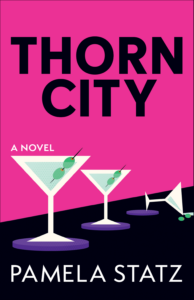
Suspected murder, eclectic food trucks, and artisanal cocaine: just another day in Thorn City.
It’s the night of the Rose City Ripe for Disruption gala—a gathering of Portland’s elite. Dressed to kill in sparkling minidresses, best friends Lisa and Jamie attend as “paid to party” girls. They plan an evening of fake flirtations, karaoke playlists, and of course, grazing the catering.
Past and present collide when Lisa stumbles across Ellen, a ruthless politician who also happens to be Lisa’s estranged mother. Awkward . . . When Lisa was sixteen, Ellen had her kidnapped and taken to the Lost Lake Academy—a notorious boarding school for troubled youth.
To make matters worse, Lisa’s boyfriend Patrick crashes the party to meet his new boss—Portland’s food cart drug kingpin.
These unfortunate encounters spur Lisa into making a fateful choice that traps her, Jamie, and Patrick in Ellen’s web.
As earth-shattering secrets are revealed, will they survive Ellen’s schemes or be sacrificed to her blind ambition?
To purchase Thorn City, click any of the following links: Amazon, Bookshop.org, PowellsInterview with the Author of Thorn City, Pamela StatzThorn City is set in Portland, Oregon. Tell us about that environment and how it impacts events in the story:
My personal experience with Portland is that it is a fun, messy, occasionally dangerous, incredibly creative city with many friendly and generous people.
My goal was to make Portland a character, a place to love and hate, to empathize with and to cheer for. I included many real locations based on personal experience — rushing a friend to Good Samaritan after an accident and sitting for hours in the waiting room, standing in the hot sun for a table at Screen Door, attending extravagant work parties in sketchy parts of town, enjoying a martini at the University Club bar, and almost colliding with a bicyclist on a test ride at River City Bikes.
Many locations are fictional, but they’re all based somewhat on reality. I hope readers enjoy what they learn about Portland, blemishes and all.
There are so many different personalities from different backgrounds in Thorn City; how did you carry out your character research?
When I first moved to Portland, I was sitting at a bar with a friend. We were swapping stories about our backgrounds, and she shared that her parents had her kidnapped and sent to a boarding school for troubled teens. She was there for over two years.
I was stunned by what she told me about her time at the school. That conversation is what really triggered the book. My heroes Lisa, Patrick and Jamie are fictional characters but their experiences at the Lost Lake Academy are grounded in truth. I started with their bios: what were their parents like, their rooms at home, their friends and siblings, how did they end up at the Academy, how they would deal with reentering the ‘real world’ after the trauma they experienced – and the story just grew from there.
The fun part was creating a cast of villains that would wreak havoc on my young heroes’ lives. I was inspired by vivid personalities I encountered while employed at Lucasfilm, WIRED, Wieden+Kennedy, and Nike, in addition to friends and frenemies.
Thorn City combines humor and the twists and turns of a thriller. How did you manage to combine the two?
I wanted the book to be humorous but also very respectful to Lisa, Jamie and Patrick’s traumatic experience at the Lost Lake Academy. The Academy is fictional but much of what I depict is based on first hand accounts from individuals who generously shared their experiences attending therapeutic boarding schools.
As I wrote, and the characters became more and more realized, I found that Lisa and Jamie were hilarious and sarcastic and they loved cracking each other up. For them, humor is a survival mechanism.
George, who is an advertising executive going through a midlife crisis, was very easy to make fun of since he takes himself so seriously. I’ve been collecting George quotes for many years now and I found that writing his character was quite cathartic.
What is your favorite thing about food trucks?
The names! Here is a sample from local Portland Food Truck Pods: Chicken and Guns, Pyro Pizza, Krazy Cups, Mac Shak, Breaking Buns, Tito’s Taquitos, Farmer and The Beast, Kim Jong Grillin, Bake on the Run, Frybaby, Philly Billy… Whew. That’s just the tip of the iceberg.
You and my husband both grew up on dairy farms in Wisconsin and graduated from UW- Madison, then left the Midwest for the West Coast. How do your childhood and college experiences inform you as a writer?
I grew up on a dairy farm in Wisconsin, and I’m the twelfth of thirteen children. Navigating that many personalities at a young age was challenging, but it revealed to me how people can view the exact same situation in entirely different ways.
I think my childhood developed my ability to step into any character’s shoes and make them sympathetic. After graduating from UW-Madison, I moved to San Francisco and worked at Wired, Lucasfilm and a few tech companies. During that time, I met many vivid personalities, attended extravagant work parties, and listened to a lot of hot air in meetings.
My fictional advertising agency Burnam & Green was born in San Francisco with a dash of Wieden+Kennedy and NIKE tossed in for good measure.
What are you working on now?I’m currently working on three projects. I’m almost finished with a sequel to Thorn City. The second project is a gothic tale that touches on my midwestern farm roots, my years living in San Francisco, and spans about eight decades, so it’s quite a departure from the fast pace of Thorn City. I’m also collaborating on a murder mystery series with my sister that takes place in a fictional town on the Puget Sound. It’s been really fun and motivating writing with her as we check in weekly and set goals.
Words of Wisdom for Aspiring Writers:
Take a class, or join a writing group, and don’t be afraid to share your writing early and often with friends, family, and writing buddies. It’s scary and occasionally disheartening but I consider it a form of quality assurance. Am I hitting the right notes? Giving away too much too early? Are readers surprised when the big secret is revealed? If not, go back and edit, edit, edit.
I have many generous friends and family who read Thorn City multiple times and their feedback was invaluable. I was also fortunate to work with great editors, one that I hired to review my first draft, and the talented editors at Ooligan Press. The first read of their editorial letters was so painful, but so true. I took their advice, made the changes, and am really proud of where the book is today.
Great advice!Author Pet Corner! Hooper!
Hooper!Hooper is a giant golden doodle who is one hundred pounds of pure snuggles.
He’s the unofficial mayor of our neighborhood in Portland. The kids at the playground all know him by name, and he has so many wonderful friends from Jonesy, Kali, and Diamond to Millie, Banjo and Osso.
You can follow Hooper on Instagram at @hooperdoodledog
Such a cute doggo!
Pamela Statz — Author of Thorn City

Pamela Statz grew up on a dairy farm in Wisconsin, the twelfth of thirteen children. She attended UW Madison earning degrees in Journalism and History.
With four duffel bags and her goldfish Lucrezia swimming in a mason jar, Pamela flew to the West Coast at the cusp of the dot-com boom and never left. She’s worked in media and advertising in San Francisco and Portland for Lucasfilm, WIRED, Nike, and Wieden+Kennedy.
She currently splits her time between Portland and Manzanita, Oregon with her husband Justin Graham and their giant dog Hooper. Thorn City is her first novel.
Learn more about Pamela by following her on social media: Instagram, Facebook, WebsiteElena Taylor/Elena Hartwell

The post Thorn City: Debut Suspense appeared first on The Mystery of Writing.
May 7, 2024
When She Was Me: A Debut Thriller
When She Was Me, the debut thriller by Marlee Bush
Author Interview + Book & Author Info!Don’t miss any debut author interviews, click the link here for more.When She Was Me
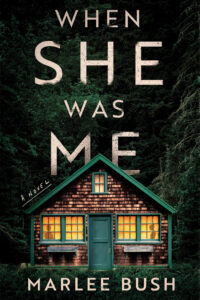
“A nail-biting story of sisterhood, suspicion, and suspense. When She Was Me weaves together past and present seamlessly to create a twist you won’t see coming.” — Tracy Sierra, author of Nightwatching
There’s only one way out of these woods…
Ever since that night, twin sisters Cassie and Lenora have been inseparable. As the sole permanent residents of Cabin Two, their refuge on an isolated Tennessee campground, they manage to stay away from prying eyes, probing questions, and true crime junkies. Just the two of them, Cassie and Lenora against the world. The peace and quiet is almost enough to make them forget what happened all those years ago. Almost.
Until a teenage girl camping at the neighboring cabin goes missing, and the memories come rushing back. As the crime becomes ever more recognizable—they know better than anyone that so-called ‘happy families’ can be anything but—each sister suspects the other knows more than she’s letting on….
Trapped in the isolating, claustrophobic wilderness, Cassie and Lenora must piece together the truth of what happened—and the sinister truth lurking in their own pasts—before it’s too late.
A taut, captivating read perfect for fans of Sally Hepworth and Kate Alice Marshall, When She Was Me is a story of sisterhood, obsession, and the ways secrets stalk us like shadows.
“When She Was Me is eerie, captivating, and full of twists.” — Darcy Coates, USA Today bestselling author of Dead of Winter
To purchase When She Was Me click on any of the following links: WALMART, AMAZON, BARNES & NOBLE & BOOKSHOP Interview with Marlee Bush —Author of When She Was Me Hi Marlee,I’m so pleased to have you join me on my blog, congratulations again on your debut!When She Was Me centers on twin sisters Cassie and Lenora. What drew you to writing about twins?First thank you so much for having me!
So when my identical twin nieces were born a few years ago, I started researching into twins and just became so interested in them. I knew I wanted to write a story about sisters but making them twins added a whole new layer to their relationship.
Though my nieces aren’t anything like Cassie and Lenora (my sister wants me to make sure I clarify that) I did try and communicate that same unique twin bond into the story.
When She Was Me is located in the wilderness of Tennessee. Tell us about that environment and how it plays a role in your debut thriller:
When She Was Me is very setting heavy. It was always supposed to be that way even in my earliest drafts. The isolation and wilderness factor is so important to the narrative.
These sisters are hiding from something, and they’re truly disconnected from the outside world. Also it was really fun to play with the creep factor of being in the middle of the woods on this practically abandoned campsite.
Tell us about your journey to publication with When She Was Me:
Buckle up, it’s a long and bumpy ride. Though this is my debut novel, it’s actually the fifth novel I’ve ever written. I tried for years to get an agent with several manuscripts. There were so many times I just wanted to give up, but I love to write. Even without the validation of publication writing brought me so much joy.
I will say when I started querying this one, my experience was different from any of my previous manuscripts. I got an agent within a few weeks, and she is literally the best in the world. The book wouldn’t exist today without her vision for it. My submission process for When She Was Me was also a dream. It was all the best kind of whirlwind, and my editor is such a rockstar. I’m a better writer after having worked with these amazing women.
What writers influenced your first novel? (and the four others you wrote before this one found a home!)
So many! My very first novel (which will never see the light of day) was probably most influenced by Twilight. Every novel after that seemed to grow and change with me. I wrote in several different genres before landing in the thriller space.
For this book, and the one before it, I really read a ton in the genre and discovered so many authors I absolutely adore. But, to keep it simple, I’d say When She Was Me is probably most influenced by Shirley Jackson, Riley Sager, and Sally Hepworth.
You have degrees in Criminology and English, the perfect combination for a thriller writer. How does your education play a role in your writing?
There is usually an investigation of some kind happening in most thrillers. My background in criminal justice has been so helpful in keeping those aspects of the story as realistic as possible.
Though I do take creative license occasionally, for the most part, I wanted everything to be accurate.
What are you working on now?
I just finished edits on my second thriller which comes out in 2025 with Poisoned Pen Press, and I’m editing what will (hopefully) be my third thriller with my agent currently. There’s also another little project I’m working on that’s super different. Hopefully I’ll be able to talk about that one really soon too!
Words of Wisdom for Aspiring Writers:
The secret to getting published? Don’t give up. I swear if you beat down enough doors and absolutely refuse to stop, one day you WILL get there. Be persistent. Have hope. And read like crazy in your genre.
Also try not to base your happiness on arbitrary goals that you have no control over. I used to ask myself if I only had one day to live what would I choose to do with it? The answer for me wasn’t writing or anything publishing related. It helped me keep life in perspective on those especially hard days in this industry. I’m rooting for every person reading this who is in the trenches!
Marlee Bush — Author of When She Was Me

MARLEE BUSH lives in Alabama with her husband and children.
With degrees in Criminology and English, she’s obsessed with true crime and documentaries. Her favorite stories to tell are the kind that make you double check the locks on your door at night.
Learn more about Marlee by visiting her website, or check out all of her links here.
Elena Taylor/Elena Hartwell

The post When She Was Me: A Debut Thriller appeared first on The Mystery of Writing.
May 3, 2024
Blindspot: a Gripping Suspense Novel
 Blindspot, a suspense novel by Maggie Smith
Blindspot, a suspense novel by Maggie Smith
Excerpt + Book & Author Info + a Guest Post + a Giveaway!
Don’t miss any blog tours, click the link here to read more!
Blindspot by Maggie Smith
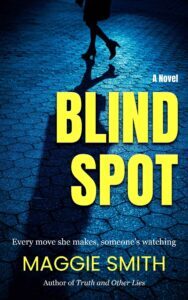 “A smart, twisty cat-and-mouse revenge tale.”
“A smart, twisty cat-and-mouse revenge tale.”
– Robert Dugoni, NY Times Best Selling Author of the Tracy Crosswhite series
An ambitious district attorney. An enemy she can’t see. A daughter at risk.
From the author of the award-winning Truth and Other Lies comes a gripping suspense novel about an ambitious prosecutor on the hunt for her sadistic stalker, only to find herself framed for murder when he turns up dead.
Rachel Matthews is used to stress—from the cutthroat world of the district attorney’s office to her escalating clashes with her teenage daughter. So when a stranger sends a lavish bouquet with a macabre message and leaves a disturbing video on her doorstep, she’s quick to act. Teaming up with an old classmate turned private investigator, she wades through old case files, searching for someone harboring a grudge against her.
But before she has time to pinpoint a suspect, her stalker issues a demand—he wants money, lots of it, or he’ll hurt her daughter. In a dangerous gamble, Rachel agrees to meet her stalker on an isolated beach, only to find herself fleeing from a shocking crime scene. Can she solve the puzzle of who wants to destroy her before she loses her family, her career, and her freedom?
Fans of Scott Turow’s Presumed Innocent will embrace this taut tale of long-simmering revenge right up to its surprising and twisty climax.
Book Details:
Genre: Psychological Suspense
Published by: Puzzle Box Press
Publication Date: May 21, 2024
Number of Pages: 318
ISBN: 9798989677917
Get your copy of Blind Spot at Amazon | Barnes & Noble | Bookshop | Goodreads
Guest Post with Maggie Smith
My First Foray into Suspense
My debut novel, Truth and Other Lies, was categorized as women’s fiction. It had a strong mother-daughter story as well as examining the challenges a young reporter faces when she uncovers a secret about her well-loved mentor.
But for my second book, Blindspot, I wanted to take on a bigger challenge. Most of the books I’ve gravitated to in the last few years have been in the psychological suspense category and I’ve been a fan of Agatha Christie since I was a teenager. Did I dare try my hand at this tricky genre? After all, not only did you need to create compelling characters, but you also had to master the skill of hiding clues, inventing red herrings that on the surface seemed possible, and pulling not only one surprise out at the end, but several others during the narrative.
In fact, my favorite novels often have a double-barreled ending—a twist that sends me reeling and then another one only twenty pages later, sometimes even on the last page (I’m looking at you, Clare Mackintosh).
In the writer world, most authors identify themselves as either a pantser or a plotter. Pantsers “fly by the seat of their pants”. They sit down every morning with only a rough approximation of what’s going to happen in their novel and through trial and error, produce a story. I tried that once. There were lots of trials, not to mention errors, and ultimately my novel was a big mess. So I became a plotter—we’re the ones with those different colored post-it notes, index cards, magic markers, and 15-point plot outlines. We count chapters, pages, even scenes. We plan it all out and then we write it, leaving room for the occasional detour but in general, we’ve got a clear idea of where we’re going and how we’re going to get there.
And we embrace guideposts. One of the ones I turned to when writing Blindspot was an article in Writer’s Digest outlining 8 tropes you often see in a thriller.
Deadlines & Countdowns – It’s common to see ticking clocks. The action may take place at a retreat that only lasts through the weekend; the hero might have 48 hours to find the kidnaped girl; a bomb is set to go off in two days. In my novel, Rachel (my protagonist) races against time to find the killer before the police arrest her.
Unreliable narrators – Ever since Gone Girl, this has become a common trope in thrillers. Readers have learned that just because someone says something doesn’t mean it’s true. Either they may be purposely hiding a secret or they may be gullible enough or trusting enough that they repeat a lie, thinking it’s the truth. I have at least two unreliable characters in my novel but I’ve worked hard to hide them in plain sight.
A protagonist that’s being framed. This is the driving force behind Blindspot. While the story starts out with Rachel hunting down her stalker, by the mid-point, it’s switched to a story where she’s being framed for that person’s murder.
A revenge plot. One of the most common plot devices in suspense thrillers is someone who is seeking revenge, often for an act committed in the past. It’s human nature to seek a reason for why bad things might be happening to our protagonist and since most people have damaged or hurt someone at some point, it’s easy to imagine someone who might want revenge, (or, as they may characterize it, justice).
Bodies, bodies, bodies. It’s hard to write a suspense thriller without at least one body. In kidnapping stories, it’s often not the victim that’s killed, but one of the gang, or one of the good guys like a cop, but inevitably, at least one person will die. In Blindspot, it’s obvious someone has been killed from the opening page, but we don’t know exactly who until midway through the book. And there will be at least one more dead body by the end, one that may shock readers who haven’t been following the clues.
Isolated locales. Whether it’s an abandoned shed, a desolate mountain trail, a creepy cemetery, or a snow-bound chalet, sticking your cast of characters in an isolated spot almost guarantees something bad will happen. In my case, I wrote about a rendezvous at a hidden Lake Michigan beach area, one I’d been to several times. The spooky factor of a meandering path, quivering shadows, and surreptitious sounds enhances the tension.
Mysterious strangers. My protagonist is going about her everyday life when three strangers enter her life through a chance encounter at a charity banquet. Each wind up playing a significant role as the story evolves in addition to an old high school friend who Rachel bumps into in a diner and who becomes her ally as she tries to clear her name.
Everyone’s got a secret. This is probably the most important aspect of any decent suspense thriller. No one is telling the whole truth, whether it’s by choice or by omission. Rachel’s hiding a secret she’s ashamed of; her daughter’s hiding a quest she’s pursuing; Rachel’s new friend Liv isn’t telling the truth about her marriage; Rachel’s keeping her stalker a secret from her boss. All these subterfuges lend an atmosphere of unease to the story, keeping the reader continually unsure as to what the truth really is.
I hope you’ll get a chance to read Blindspot when it releases May 21 and I’d love to hear what you think of my first try at a thriller. Did I succeed in fooling you or did you guess the ending? What character did you enjoy the most? Which clues did you spot and which ones did you miss?
Drop me a note at https://maggiesmithwriter.com/contact/.
Read an excerpt of Blindspot:
April 24, 2023, County Courthouse
The killer is sitting in this courtroom and it’s up to me to prove it.
It isn’t every day a murder this sensational happens in Milwaukee. Sure, we’ve had our share of drive-by shootings, domestic arguments that escalated, home invasions that turned deadly. And yes, there was that lurid trial a while back where the deranged sicko drugged, then ate his victims. That one landed our city in the national spotlight. A once in a lifetime case.
But this one’s right up there. Everyone involved is high profile. Which means it warrants the top guns. Which means my boss of nine years, Marcus Huntley, Deputy DA, is sitting first chair. I catch his eye and his expression confirms what I already know. This is the most important case of my career, and if the verdict goes south, any hope for that promotion goes right along with it.
But this isn’t only about winning for me. There’s a lot more at stake. Consequences I don’t dare think about or I’ll lose my nerve. Because even though the police are convinced this is an open and shut case, I know better.
I know they’ve arrested the wrong person.
Because I witnessed the murder. But for reasons I can’t reveal, I have to keep quiet. Only two people know the whole story and I’ve sworn them to secrecy.
I watch the crowd. Examine every person in detail. Who’s talking to whom, who’s staring at their lap, who’s looking around the room. Who’s fidgeting, adjusting their tie, or rummaging through their purse. Who looks bored and who looks agitated? But even though I’m an expert in spotting a tell, I’m coming up empty.
The electricity in the air ratchets up as the judge enters and the bailiff calls the case. I’ve been up most of the night, pacing the floor, rehearsing my lines, imagining how today would go. What to say and what not to say. What needs to happen so I can walk out of here satisfied.
Part of me wants to scream. Part of me wants to whimper. Part of me wants to rush out the door and never look back.
But I don’t do any of those things. Instead I steel my nerves and set aside the theatrics. A bead of sweat slithers down my spine as I stand to address the judge.
In an orange jumpsuit. And handcuffs.
“Rachel Elizabeth Matthews. You stand accused of first-degree intentional homicide.
How do you plead?”
“Not guilty, Your Honor,” I reply.
*** Excerpt from The Blindspot by Maggie Smith. Copyright 2024 by Maggie Smith. Reproduced with permission from Maggie Smith. All rights reserved.
Maggie Smith — Author of Blindspot

In a career that’s included work as a journalist, a psychologist, and the founder of a national art consulting company, Maggie Smith added novelist to her resume with the publication of her debut, Truth and Other Lies, a women’s fiction novel set in Chicago and released in March 2022 by Ten16 Press. It won NIEA’s Juror Grand Prize, the Star Award for Debut Fiction from Women’s Fiction Writers Association, Foreword INDIES Gold Metal for General Fiction, and was selected for the Women’s Book Association Great Group Reads.
In addition to her writing, Maggie hosts the weekly podcast Hear Us Roar (215+ episodes), blogs monthly for Rocky Mountain Fiction Writers and is Managing Editor for Chicago Writer’s Association Write City E-Zine. She resides in Milwaukee WI with her husband and her aging but still adorable sheltie. Her second novel, a psychological suspense called BLINDSPOT will be released in May 2024.
To learn more about Maggie, click on any of the following links: MaggieSmithWriter.com, Goodreads, BookBub – @MaggieSmithWriter, Instagram – @maggiesmithwrites, Threads – @maggiesmithwrites & Facebook
Visit all the Stops on the Tour!
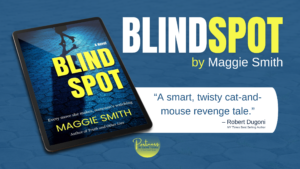
04/29 Review @ Country Mamas With Kids
04/30 Showcase @ Books, Ramblings, and Tea
04/30 Showcase @ Mystery, Thrillers, and Suspense
05/01 Showcase @ Archaeolibrarian – I Dig Good Books!
05/02 Review @ Because I said so
05/03 Guest post @ The Mystery of Writing
05/05 Showcase @ Cassidys Bookshelves
05/06 Review @ Confessions of the Perfect Mom
05/06 Review @ Novels Alive
05/07 Review @ ashmanda. k
05/08 Review @ Catreader18
05/10 Showcase @ Silvers Reviews
05/11 Showcase @ suspenseisthrillingme
05/12 Review @ Book Reviews From an Avid Reader
05/14 Interview @ Hott Books
05/15 Interview @ darciahelle
05/16 Review @ mokwip8991
05/17 Review @ Nursevicreads
05/18 Review @ The AR Critique
05/19 Review @ Guatemala Paula Loves to Read
05/20 Review @ reviewsbyrudra
05/21 Review @ Paws. Read. Repeat
05/22 Review @ fuonlyknew
05/22 Review @ Pat Fayo reviews
05/23 Showcase @ Celticladys Reviews
05/23 Showcase @ Teatime and Books
05/24 Review @ bookwormbecky1969
Elena Taylor/Elena Hartwell

The post Blindspot: a Gripping Suspense Novel appeared first on The Mystery of Writing.
May 1, 2024
Knife River: A Ty Dawson Thriller
 Knife River, a crime thriller by Baron R Birtcher
Knife River, a crime thriller by Baron R Birtcher
Guest Post + Excerpt + Book & Author Info + Giveaway!
Don’t miss any blog tour post! Click the link here.
Knife River
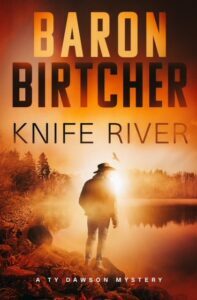
A sheriff fighting to keep the peace in 1970s Oregon faces a shocking secret from his town’s past, in this crime thriller from the author of Reckoning .
There are rules in the West no matter what era you were born in, and it’s up to lawman Ty Dawson to make sure they’re followed in the valley he calls home. The people living on this unforgiving land keep to themselves and are wary of the modern world’s encroachment into their quiet lives.
So it’s not without some suspicion that Dawson confronts a newcomer to the region: a record producer who has built a music studio in an isolated compound. His latest project is a collaboration with a famous young rock star named Ian Swann, recording and filming his sessions for a movie. An amphitheater for a live show is being built on the land, giving Dawson flashbacks to the violent Altamont concert. Not on his watch.
But even beefed up security can’t stop a disaster that’s been over a decade in the making. All it takes is one horrific case bleeding its way into the present to prove that the good ol’ days spawned a brand of evil no one wants to revisit . . .
Book Details:
Genre: Crime Thriller
Published by: Open Road Media
Publication Date: April 23, 2024
Number of Pages: 338
ISBN: 9781504086523 (ISBN10: 150408652X)
Series: The Sheriff Ty Dawson Crime Thriller Series
To purchase a copy of Knife River click on any of the following links: Amazon | Barnes & Noble | BookShop.org | Goodreads | Open Road Media
Guest Post by Baron R Birtcher
COWBOYS, WRITERS & MUSICIANS
and
THE ORIGINS OF KNIFE RIVER AND THE TY DAWSON SERIES
I have long held the belief that you can tell a lot about a cowboy by the way he treats his hat; the way he wears it, and the way he treats it when he takes it off his head. The same can be said about a musician and his instrument, the songwriter and his guitar. We reveal ourselves by the way we treat our favorite objects, and even more so the way we treat our animals, or speak about others in their absence, and the way we treat both friends and strangers in their presence.
I also believe it is the writer’s responsibility to reveal these things—in sum and substance, it is the very core of what we do. If we fail to reach for revelation, for insight, unique perspectives and observations, we are selling ourselves short, and likewise our readers.
In my life, I have had the great joy to participate in all of these pursuits—horseman, musician, and writer—and for me, there is a distinct confluence, a synergy among them that has taught me a great deal about nature, people, and the world.
* * *
In recent weeks, I have been doing a number of talks and signings in support of the release of the newest installment of the Sheriff Ty Dawson crime thriller series, KNIFE RIVER. As has always been the case, my favorite part of those events is the audience Q&A, where readers get to delve deeper into the backstory, the characters, the musical references, and details about the writing process. But the question I encounter most frequently regards the origins of Ty Dawson, and the fictional locale Meriwether County, in which Dawson plies his trade as both a rancher and a sheriff.
In fact, I often characterize the series as Longmire meets Yellowstone in the 1970s.
Frankly, I love that these books are so evocative for many of us, and the fact that they take place during the 1970s conjures such a vast mélange of memories, images and feelings. I had hoped the series would be an immersive reading experience as I was writing it, and I have been rewarded by kind comments from readers to that exact effect, which truly warms my heart.
So, I thought it might be interesting to share with you a slightly more detailed version of the response I offer when asked about the origins of Sheriff Ty Dawson, and I hope it adds dimension and depth to the stories for you, and enriches the experience—as is my intention.
* * *
I like to say that I was born in South California (a term that is infrequently—if ever—used by anyone other than me, but I’ve always liked the look of those words on the page), birthed at the crossroads of the Eisenhower and Kennedy eras, reared in the shadow of Aquarius, and graduated from high school in the ballroom of the Hotel California.
I celebrated my 40th birthday while living in Kona, Hawaii, and after fifteen years in that island paradise, moved to the Willamette Valley, Oregon, where my wife and I reside today. But South California has remained as much a part of me as I of her, and not only because I still have family living there.
I was raised on a small ranch in San Juan Capistrano, a tiny (at the time) agricultural hamlet on the southern California coast, in many ways very much like the fictional town of Meridian, the epicenter of the Ty Dawson series, which began with the award-winning SOUTH CALIFORNIA PURPLES. And, like my central character Ty Dawson, I grew up surrounded by horses, cattle, and untolled acres of farmland (orange groves, strawberries, avocados and cattle in my case), learning to saddle and handle a horse (a pony, at first) by the time I had reached my fourth birthday.
The timeline of the Ty Dawson series is set in the mid-1970s, although I chose that period for reasons most people may not be aware. I am the youngest of three children, with a brother and sister who are six- and four- years my senior, respectively. As the youngest among us, I had the distinct advantage of observing the experiences, glories and errors experienced by my siblings, and did my level best to steer clear of the growing list of things they did that drew the ire of my parents.
In 1973, the year in which the first of the Ty Dawson mysteries takes place, I was twelve years old. The very serious conversations that were taking place around our dinner table that year revolved around my brother having attained the age of registration for the military draft—the war in Vietnam continuing to rage unabated—augmented by stern warnings to my high-school-aged sister to avoid the manifold dangers of hallucinogenic drugs and, of course, boys. I listened with rapt interest and no small amount of trepidation, my pre-teen mind not always comprehending the complexities of the subject matter, nor the reasons my parents appeared so enormously apprehensive about the chaotic state of our world at that time, and the escalating social turmoil in our country. In retrospect, I suppose I believed that watching body-counts being tallied like box scores on the nightly network news was the norm.
* * *
Jump-cut to the year 2020, the year my family learned my father’s health had deteriorated both suddenly and considerably, and he had been given only a short time to live. Thankfully, my tribe had always been a close one, so we rallied around him in his final months, spending time together reminiscing and listening to his recollections of life growing up in Orange County, California. It was only then that I realized the breadth of all I hadn’t understood as a young boy listening in at that dinner table back in the tumultuous 1970s, more fully appreciating the concerns and fears that my parents had faced in raising teenagers amidst the Age of Aquarius, at the confluence of free-love, war and protest, and the social and political fallout that was to follow.
I began to see my father through a different lens, and as I did, Ty Dawson came fully to life in my imagination during those precious weeks. In 1973, he was a 40-year-old man who had seen battle in the Korean War; a man who had been raised with a set of expectations fostered by the Eisenhower era, staking a claim on an American Dream that was changing drastically and rapidly, right before his eyes. A man who witnessed his children coming to terms with wildly different challenges than he’d had to cope with in his youth.
And as I sifted and explored the mindset from which Ty Dawson arose—myself having become a parent (and grandparent) now—Ty grew into a fully-fledged, three-dimensional character for me, as did Ty’s wife and daughter, and the friends and neighbors that have come to populate Dawson’s hometown, fictional Meriwether County. As a result, every moment I spend with Sheriff Ty Dawson as I write this series, I can hear the voice of my late father, who thankfully lived long enough to see the publication of South Calfornia Purples, and the dedication page in that volume which bears his name.
* * *
I spent those intervening years first as a working musician, record producer, and as an artist manager—advising, listening, traveling, laughing, negotiating and sometimes arguing with some of the most fascinating people in the world; my exposure to the music of my youth informing every mile and every moment. Perhaps one of my most cherished chapters from that period came from my association with legendary music- and film-producer, James William Guercio, founder of the famed Caribou Ranch Studios.
Situated in the rural front range of the Rocky Mountains of Colorado, Caribou Ranch became the iconic recording resort home-away-from-home for artists as varied as Paul McCartney, Elton John, Michael Jackson, Chicago and John Lennon (among dozens of others). This association formed the backbone of a fictionalized narrative thread in KNIFE RIVER, which to say much more about would spoil the fun…
* * *
My parents departed southern California for the Napa Valley almost 35 years ago now, though my two siblings remain, these days surrounded by the houses and highways that have replaced the vast acreage of orange trees, the golden blooms of wild mustard weed, and the lowing of cattle in the folds inside the foothills of my youth. But as many of us would likely agree, the place that dwells inside the root system of one’s childhood never departs—the landscape might look different, replaced or revised from that which resides inside our memories, but the heart still skips a beat when first returning ‘home’ after an absence.
Now, with the publication of KNIFE RIVER, I invite you to join me on the ride with Sheriff Ty Dawson, and to (re)visit those heady, turbulent, beautiful and terrifying times; and to join me on Facebook and Instagram at: Facebook: www.facebook.com/BaronRBirtcher & Instagram: www.instagram/BaronBirtcher_author
Books in the Ty Dawson series: South California Purples, Fistful Of Rain, Reckoning, Knife River
Read an excerpt:
Knife River
Prelude:
FACING WEST
SOME SAY THAT to be born into a thing is to be blind to half of it. Oftentimes, the things we seek and discover for ourselves are those we hold most dear.
Any cattleman will tell you that a ranch is a living thing. Not only the livestock that graze the meadowland, but the blood that nourishes the hungry soil, the trees that inhale the wind, and the rain that carves runnels into the hardpan that, in time, grow into rivers. The Diamond D is no different in that respect, some would even say it was the beating heart of Meriwether County, Oregon.
As both a stockman and the sheriff of this county, I believe this to be true.
But the events that unfolded in the autumn of 1964 cast a cloud across that land. Not just across my ranch, but the entire valley, though they didn’t bear their terrible fruit until nearly a dozen years later, in the spring of 1976. The incidents still haunt me, though others paid a steeper price than I; some with their lives, or the lives of their loved ones, while some forfeit their sanity, and still others with their souls.
That is where this story begins.
CHAPTER ONE
LAMBS AND LIONS hold no sway over the springtime here in Meriwether County. Some years it will snow through mid-May, other times the golden sun rides high and bright, and the river flows fast, clear and deep with high-country melt on the first day of March. Most years, it’s both, with Mother Nature keeping her whims to herself until she alone decides to turn them loose upon us.
But this particular Saturday morning was unusually quiet, not even a breath of breeze stirring the leaves of the cottonwoods that grew thick and untamed along the creekbank. I was standing outside on the gallery, sipping my coffee as I leaned on the porch rail, watching my wife, Jesse, hammer the last nail into a birdbox she had made. She must have felt my eyes on her, as she looked up from her work and smiled. A few moments later, she stepped up the stairs to where I stood and kissed me on the cheek, smelling of sawdust and lemongrass tea.
“The bluebirds are back,” she said. “I just saw them.”
“You haven’t lost your knack for building those things.”
“Plenty of practice. You got home late last night.”
I had spent the previous day transporting a man all the way from Lewiston up to the Portland lockup to await his trial. He stood accused of murdering his own wife and young child. It had been a long, depressing day, and by the time I completed the intake paperwork, locked up the substation in Meridian, and finally drove home to the ranch, Jesse was already asleep.
But this morning, everything in her expression seemed overflowing with hope and expectation. Springtime was her season and always had been.
“Want a hand putting that thing up?” I asked.
She replied by handing it to me, together with the hammer.
She watched me hang the birdbox on a post beside the vegetable garden, outside the kitchen window where I knew she’d spend her quiet mornings secretly observing the bluebirds as they built their nest and reared their brood.
“You plan on helping Caleb pick the new cowboys today?” She asked me when I came back inside.
It was the time of year when we hired a few temporary hands for Spring Works, when we’d round-up the cattle and calves from every corner of the ranch; we’d vet, brand and sort the livestock, and mend a perpetual string of breaks in the wire along miles of fenceline before we turned the herd out to the pastures for summer grazing. The Diamond D employed three permanent cowboys in addition to me and old Caleb Wheeler—our foreman for more than three decades—but with 63,000 deeded acres and another 14,000 under a Land Management lease, Spring Works was more work than the five of us could handle in the short span of time required to get it done. Every year a couple dozen hopeful itinerant riders, ropers, rodeo bums and saddle-tramps would answer the call for a temporary employment opportunity, and every year Caleb Wheeler got more riled up about what he viewed as the eroding quality of the contemporary American cowboy. He’d cuss and grump and holler about it, but he’d end up settling on three or four hands he reckoned could help us get the job done with a minimum of aggravation.
“I’m staying out of it this year,” I said, and Jesse grinned. “Figured I’d lay in a cord or two for the woodshed instead, before the weather gets too hot.”
“I saw some deadfall down by Corcoran’s,” she said.
“That’s where I was headed.”
“Make you some lunch to take with you?”
“I don’t intend to be out that long.”
“Good to hear,” she said, and winked at me before she turned, and stepped inside the house.
* * *
HALF AN HOUR later I was straddling a fallen spruce, angling the chainsaw to buck the trunk into three-foot rounds that I’d later split into quarters with the long-handled axe. The solitary labor, the sweat staining my shirt, and the burn down deep inside my muscles were a welcome balm after the week I’d had, and the air was rife with the smell of pine tar, sap and chain oil. I looked up and caught some movement in the distance, where the BLM forest gave onto an open range already knee deep with wildflowers and whipgrass. I recognized Tom Jenkins’ roping horse moving hellbent-for-leather across the flats, with young Tom leaning across her withers, one hand on the reins and the other holding his hat in place on top of his head. His mount was an admirable animal, a grullo Quarter Horse that stood nearly seventeen hands, fast and thick through the chest. Tom Jenkins handled her well, and he was beelining in my direction like he had something on his mind.
I killed the power on the chainsaw and set it in the bed of the military surplus jeep I use when I do ranch work, stepped over to the fence and took a splash of water from the canteen I’d hung in the shade of a young cedar. I didn’t have to wait long before Tom pulled up in a skidding stop inside a cloud of dust, throwing a cascade of torn earth and pebbles through the barbed strands of the wire.
“Mr. Dawson,” he said and touched a finger to his hat brim, sounding nearly as breathless as his horse. “I was hoping that was you.”
“What are you doing out here all by yourself?” I asked, but suspected I already knew the answer.
When I’d first met Tom Jenkins, he was nothing but a kid with a limp handshake, no eye-contact, and the familiar slope-shouldered gait and posture of the typical aimless teenaged slacker. At that time, he’d been well on his way to serious trouble, the variety and scope of which would have landed him in a six-by-eight jail cell where the other inmates would have eaten him alive.
He is the nephew of my neighbor to the south of me, Snoose Corcoran, whose sister had sent the kid up here from California’s central valley to his uncle’s ranch in southeastern Oregon in hopes of putting some distance between young Tom and his unquestionably poor choices of acquaintances. Ill-equipped to deal with the boy himself, Snoose begged me to take the kid on as a maverick, and I’d reluctantly agreed. After six months working side by side with trail hardened cowboys on the Diamond D young Tom Jenkins’ attitude had been readjusted, straightening both his spine and fortitude. Now, at barely 18 years of age, Tom had assumed the reins of the floundering Corcoran cattle operation from his uncle Snoose, who had been gradually disappearing into a bottle.
“Cow and a calf went missing from my place,” Tom answered. “Fence busted by the westward line, and I figured them two mighta headed for the water.”
My ranch hands ended up nicknaming the kid “Silver,” after he’d astonished us all by stepping up and winning a silver buckle for the Diamond D in the team roping event at the annual rodeo. I knew Tom secretly treasured the handle they’d bestowed, wore it like a medal, but I never spoke it; that was between my men and him.
“Where’s your uncle?” I asked.
His shrug spoke sorrowful volumes.
“So, what set you hightailing over here to see me, son?” I asked. “What’s the trouble? Besides the missing beeves.”
“I was up there on the other side of the tree line,” he said. He twisted sideways in his saddle, took off his hat and gestured with it toward a distant stretch of blue sky. “There was an eagle making low passes over the meadow, so I stopped to watch it for a minute. It was so still and quiet out there, I could hear the eagle calling out while it was gliding on the thermals.”
“You don’t see something like that every day,” I said. “Not even out here in the boondocks.”
“No sir, that’s a fact,” Tom said. “But, while I sat there watching that creature flying, all of a sudden and out of nowhere, a helicopter come buzzing across the ridge, you know the one…”
“Big stone bluff, looks like somebody cut it down the middle with a KA-BAR knife.”
“That’s the one,” he said. “Well, that chopper came in fast, and went straight toward that bird…” The young man’s voice trailed off, his face contorted like he’d encountered a foul odor. “They circled it as it flew, like they were teasing it. Two men inside the—whattaya call it?”
“Cockpit.”
“Yeah, the cockpit. Then they started closing in on him, chasing it. The guy in the passenger seat had a rifle in his hands. I could see the barrel sticking out.”
What Tom was describing to me was not only a despicable and loathsome act, it was a serious crime. The mere harassment of a protected species is a federal offense; hunting and killing one merely for the sick thrill of it was another matter entirely.
“What happened, Tom?”
He swallowed drily, shook his head and looked down at the ground between us.
“He shot that bird right out of the sky, sir,” he said. “That eagle wasn’t even doing nothing, just gliding circles on the wind, and those assholes—sorry, sir—they shot him cold dead.”
I could imagine the creature’s confused and lonely cry as it spiraled down, bleeding, terrified and helpless, to the earth.
“You pretty sure about the location, Tom?”
“About four, five miles thataway, near the bluff, where the river makes that sharp bend to the south.”
“Did you get a look at either of the men?”
“Naw, they were too far away and moving pretty fast. But I got a good look at the whirlybird.”
I asked him for a description of the helicopter, and I knew right away he was referring to a Bell H-13, known to soldiers as a “Sioux.” They’d been in common use as scouting and medical evacuation aircraft by the military. I’d seen them every day when I was stationed in Korea.
“Like the choppers on that TV show?” I asked.
“Yes, sir. Exactly like on M*A*S*H.”
“Big glass bubble on the front? No doors? Looks kinda like a dragonfly?”
“Yes, sir.”
“Did you see any numbers written on it? On the tail? Or maybe on the underside?”
Tom Jenkins pressed his hat back on his head and gazed up at the empty sky beyond the forest, like he could return that beautiful animal to where it rightfully belonged through sheer force of his will. The high peaks beyond the meadow were streaked with deep blue shadows in the sunlight, their cloughs and gorges washed in purple and topped with snow so white it hurt your eyes.
“I’m sorry, sir,” he said. “I don’t remember seeing numbers or anything like that.”
His face took on the aspect of defeat, as though some personal failure had cost the animal its life.
“You did good, Tom. You did the right thing coming to me straight away. There was nothing else you could have done.”
He nodded once, his lips pressed tight, and he leaned down to adjust a stirrup that needed no adjustment.
“You want some help finding your cows?” I asked, thinking he might appreciate the company.
“I can do it, sir, but thank you. I can haze ’em back home on my own.”
“You gotta get eyeballs on the critters first. I can help you, son.”
“Thank you just the same, Mr. Dawson… Sheriff… Hell, I don’t even know what to call you.”
His expression softened for the first time since he’d showed up, a brief and fleeting smile, then his focus drifted far away again.
“Something else, Tom?”
“Just wondering.”
“Wondering what?”
“Do you think you can catch those guys who shot that bird?”
“I’m going to try my damndest.”
His eyes remained fixed on the horizon.
“What’ll happen to ’em if you do?”
I drew a bandana from the back pocket of my jeans, removed my hat, and dried the sweat that had been leaking from beneath the band.
“It’s been against the law to kill an eagle since the 1940s. If you’re not an Indian, you can’t even possess a single feather. If you get caught, you pay a steep fine and then they send you off to jail. If you’re a rancher, you could lose the leases on your land.”
Tom turned his gaze back on me, and I noted for the hundredth time that this young man no longer bore any resemblance to the person he had been on the day he first arrived here from California.
“That punishment don’t seem tough enough,” Tom said. “Not for what I seen ’em do.”
“No, it doesn’t.”
He clucked softly to his horse, and reined her back in the direction from which they’d come.
“I’d better get a move on,” he said.
“Be careful out there, son,” I said to his retreating back, but my words were lost in the distance.
Excerpt from Knife River by Baron R Birtcher. Copyright 2024 by Baron R Birtcher. Reproduced with permission from Baron R Birtcher. All rights reserved.
Knife River Author —Baron R Birtcher
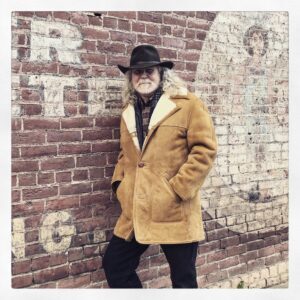
Baron R Birtcher is the LA TIMES and IMBA BESTSELLING author of the hardboiled Mike Travis series (Roadhouse Blues, Ruby Tuesday, Angels Fall, and Hard Latitudes), the award-winning Ty Dawson series (South California Purples, Fistful Of Rain, Reckoning, and Knife River), as well as the critically-lauded stand-alone, RAIN DOGS.
Baron is a winner of the SILVER FALCHION AWARD, and the WINNER of 2018’s Killer Nashville READERS CHOICE AWARD, as well as 2019’s BEST BOOK OF THE YEAR for Fistful Of Rain.
He has also had the honor of having been named a finalist for the NERO AWARD, the LEFTY AWARD, the FOREWORD INDIE AWARD, the 2016 BEST BOOK AWARD, the Pacific Northwest’s regional SPOTTED OWL AWARD, and the CLAYMORE AWARD.
Catch Up With Baron R Birtcher: Facebook – @BaronRBirtcher, Goodreads, BookBub, Instagram – @baronbirtcher_author & Twitter/X – @BaronBirtcher22
Visit all the Stops on the Tour!
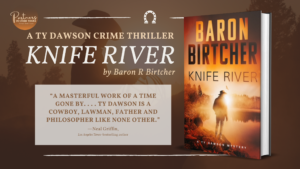
04/17 Showcase @ Mystery, Thrillers, and Suspense
04/18 Review @ Because I said so — and other adventures in Parenting
04/19 Showcase @ Books, Ramblings, and Tea
04/21 Showcase @ The Mystery Section
04/23 Book Talk with Fran Lewis Radio Interview
04/23 Review @ Just Reviews
04/24 Showcase @ Archaeolibrarian – I Dig Good Books!
04/30 Review @ Book Reviews From an Avid Reader
05/01 Guest post @ The Mystery of Writing
05/01 Review @ Avonna Loves Genres
05/02 Review @ Novels Alive
05/02 Showcase @ Celticladys Reviews
05/05 Review @ Elicias Book Haven
05/06 Showcase @ Silvers Reviews
05/07 Review @ Guatemala Paula Loves to Read
05/08 Review @ fuonlyknew
05/08 Review @ Why Not? Because I Said So Book Reviews
05/09 Review @ aratecla_the_bookrat
05/09 Review @ Pat Fayo reviews
05/10 Review @ Melissa As Blog
05/10 Showcase @ Teatime and Books
08/23 Mysteries to Die For: Toe Tags Podcast
Elena Taylor/Elena Hartwell

The post Knife River: A Ty Dawson Thriller appeared first on The Mystery of Writing.
April 30, 2024
Hidden Rooms: A Debut Mystery
Hidden Rooms, the debut mystery by Kate Michaelson
Author Interview + Book & Author Info + Author Pet Corner!Read a terrific guest post from Kate Michaelson from her Partners in Crime Book Tour! Click the link here.Hidden Rooms by Kate Michaelson
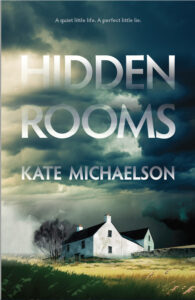
Long-distance runner, Riley Svenson, has been fighting various bewildering symptoms for months, from vertigo to fainting spells. Worse, her doctors can’t tell her what’s wrong, leaving her to wonder if it’s stress or something more threatening. But when her brother’s fiancée is killed—and he becomes the prime suspect—Riley must prove his innocence, despite the toll on her health.
As she reacquaints herself with the familiar houses and wild woods of her childhood, the secrets she uncovers take her on a trail to the real killer that leads right back to the very people she knows best and loves most.
For readers who enjoy Deer Season by Erin Flanagan, All Good People Here by Ashley Flowers, and A Flicker in the Dark by Stacy Willingham.
To purchase Hidden Mystery, click any of the following links: Amazon, Gathering Volumes, Bookshop.org, or CamCat BooksInterview with the Author of Hidden RoomsHi Kate,
I’m so pleased to have you join me on my blog, congratulations again on your debut!
Aside from being a distance runner, Riley is a computer forensics expert in her late twenties. Although she’s from a small Ohio town, she went away for college and then moved to Seattle afterwards.
At the start of the book, she has just moved back to her hometown in the wake of her father’s death, and she’s trying to keep her family from falling apart while also looking for a diagnosis to some troubling health issues.
Hidden Rooms also focuses on chronic illness. What drew you to that as an aspect of Riley’s character?
I know a lot of women, myself included, who have dealt with complex diseases and had trouble finding a clear diagnosis and treatment. When I began having health problems, I realized that if I was going to find answers, I would need to act a lot like a detective as I went from specialist to specialist and tried to put the larger picture together. It struck me that this journey to find the truth about one’s own health could work well as part of a mystery.
In addition to the inherent mystery of poorly understood illnesses, not being able to find a diagnosis while feeling chronically ill can lead to a lot of self-doubt. This is key to Riley’s experiences in Hidden Rooms as she’s often unsure whether she should trust her instincts or if, as some doctors have implied, she’s ‘making too much’ of things.
Hidden Rooms is set in the Midwest. Tell us about the environment and how it impacts the characters and the story:
When I began writing, I knew I wanted to depict the area of rural Ohio where I grew up. I love mysteries that transport me to another place, but it has also meant a lot to me on the rare occasions when I’ve encountered books that depict life in the rural Midwest, like Erin Flanagan’s Deer Season.
The town of North Haven is fictionalized, but it’s a tight-knit community like my hometown. Riley and her brother Ethan also represent a lot of relationships I see in small towns between people who have chosen to stay where they grew up and those who have gone away. I think there can be envy on both sides of this dynamic because the people who stay in their hometown maintain those close friendships and family ties, but the people who leave experience a greater variety of people and places. We see this tension in Riley and Ethan’s relationship when Riley moves back to North Haven after years of living elsewhere.
Tell us about your journey to publication:
When I began writing Hidden Rooms, my goal was simply to finish the novel. Though I’d written poetry and nonfiction for a long time, I was new to writing fiction. I learned so much from a local critique group and from online Sisters in Crime workshops and classes.
About a year later, once I had a polished draft, I began querying agents, which writers know can be a very long process. A couple of months into my querying journey, I attended New England Crime Bake where I met a number of agents and editors who requested my manuscript. I also met another author, Marcy McCreary, who told me about her publisher, CamCat Books, and what a great experience she’d had with them.
Soon after attending the conference, I received the Hugh Holton Award from MWA Midwest for one of the best unpublished mysteries by a Midwest writer. This was such a boost to my confidence and definitely bolstered my query letters. I ended up receiving offers from an agent and from CamCat Books around the same time. I was lucky to have two good options, but I ultimately decided to go with CamCat after talking to several authors who had nothing but great things to say about the publisher.
You hold a PhD in Educational Psychology, what does that entail and how do you put that into practice as a curriculum designer?
Educational psychology is the study of how we learn and includes everything from social-emotional components and motivation to cognitive processes. I specialized in studying how students determine what is true when confronted with multiple news sources.
After completing my degree, I worked for a curriculum development company to create educational materials to teach media literacy.
What are you working on now?
Right now I’m querying a humorous standalone mystery called Resting Sad Face that follows a professional mourner in Florida who gets drawn into the suspicious death of a real estate developer she’s hired to eulogize.
I’m also working on the sequel to Hidden Rooms, which kicks off with human remains being found in a farm field that Riley’s family used to own.
Words of Wisdom for Aspiring Writers:
There’s a popular quote from Ira Glass about how when writers and artists first start creating, there’s a gap between their taste and what they desperately want to create versus their abilities. I know I put all kinds of work into my early drafts and then realized it still wasn’t what I wanted it to be. My advice is not to get discouraged at this point. Keep learning the craft, read others whose writing you admire, and keep revising and writing.
Writing good fiction is not an innate ability. It’s something that takes practice, so keep going until you’ve told the story you meant to tell.
Author Pet Corner!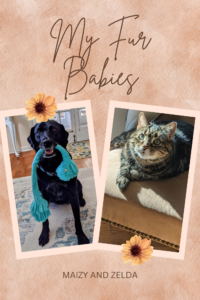 I love any opportunity to talk about my pets!
I love any opportunity to talk about my pets!
My husband and I have two rescues, a cat named Zelda and a black lab mix named Maizy. We love them both, but Maizy is such a character that I had to include a fictionalized version of her in my book. We adopted her from the local animal shelter when she was a year old. She had lived as a stray before that and was practically feral. On top of that, she had more energy than any dog I’d ever seen.
Even though she was a hard-headed handful who destroyed everything in sight, she was also incredibly fun and loving. In Hidden Rooms, Riley has a black lab mix named Bruno. He’s a bit calmer than his real-life counterpart, but shares some of her quirks—including being quite the accomplished digger.
Kate Michaelson, debut author of Hidden Rooms
Kate Michaelson’s debut novel, Hidden Rooms, won the 2022 Hugh Holton Award for best unpublished mystery by a Midwest writer and will be released by CamCat Books on April 30, 2024. She holds an MFA in poetry and a PhD in Educational Psychology, and her articles, short stories, and poems have appeared in academic and literary journals.
As a curriculum developer and technical writer, she has created educational content on everything from media literacy to cybersecurity awareness. In her free time, she loves doing anything that takes her outdoors and away from her laptop.
She is active in Sisters in Crime, Mystery Writers of America, the International Thriller Writers Debut Authors Program, and organizations that support those with disabilities and chronic illness. She lives in Toledo, Ohio with her husband, a dog, and a cat that runs the show.
Learn more about Kate by following her on social media: Website, Twitter/X, Instagram, Facebook, and BookBub.Elena Taylor/Elena Hartwell

Header image from Pixabay
The post Hidden Rooms: A Debut Mystery appeared first on The Mystery of Writing.
April 25, 2024
Kate Michaelson: Debut Mystery Author
Kate Michaelson, debut author of Hidden Rooms
Author Guest Post + Book & Author Info + a Giveaway!
Kate Michaelson debuts with Hidden Rooms
 When murder hits home.
When murder hits home.Long distance runner Riley has been fighting various bewildering symptoms for months, from vertigo to fainting spells. Worse, her doctors can’t tell her what’s wrong, leaving her to wonder if it’s stress or something more threatening. But when her brother’s fiancée is killed—and he becomes the prime suspect—Riley must prove his innocence, despite the toll on her health.
As she reacquaints herself with the familiar houses and wild woods of her childhood, the secrets she uncovers take her on a trail to the real killer that leads right back to the very people she knows best and loves most. For readers who enjoy Deer Season by Erin Flanagan, All Good People Here by Ashley Flowers, and A Flicker in the Dark by Stacy Willingham.
Genre: Mystery Published by: CamCat Books Publication Date: April 30, 2024 Number of Pages: 320 ISBN: 9780744310153 (ISBN10: 0744310156)
To purchase Hidden Rooms, click any of the following links: Amazon | Barnes & Noble | BookShop.org | Goodreads | CamCat Books
Kate Michaelson — Author of Hidden Rooms — Guest Post
 There’s a particular joy in feeling as if the place you’re from matters, and that’s one of many reasons why I chose to set my debut mystery, Hidden Rooms, in small-town Ohio. Don’t get me wrong. Some of my favorite mysteries are set in places I’d love to visit—from national parks to English villages.
There’s a particular joy in feeling as if the place you’re from matters, and that’s one of many reasons why I chose to set my debut mystery, Hidden Rooms, in small-town Ohio. Don’t get me wrong. Some of my favorite mysteries are set in places I’d love to visit—from national parks to English villages.
But as much as I love traveling the world through the eyes of my favorite protagonists, the intimately familiar setting of the rural Midwest has a special place in my heart. Whenever I return to my hometown of Greenwich, Ohio, the beauty of the landscape takes my breath away. Maybe it’s nostalgia talking, but I don’t know of anything lovelier than a rolling wheat field edged by woods, a pasture of tall grass roiling like the sea, or a fencerow crowded with every wildflower imaginable.
Rural landscapes have an undeniable beauty, but those remote expanses can also be starkly unforgiving. Vast tracts of farmland and dense forests act like characters themselves in a mystery, adding to the sense of isolation and challenge. There’s space to hide, to get lost, and for all manner of nefarious deeds to unfold. 
Beyond the landscape, small communities offer an intriguing social dynamic for mysteries since residents not only know one another but are often acquainted with generations of each other’s families. But knowing names, faces, and family trees isn’t the same as knowing what’s going on inside a person. Given the power of small-town gossip, many residents in these communities become particularly adept at keeping their secrets to themselves.
In Hidden Rooms, the swirling rumors of affairs, addictions, and shady pasts—mixed in with legitimate secrets—make it especially difficult for my protagonist to separate fact from fiction. More than anything else, I set Hidden Rooms in small-town Ohio because it’s a place I love, full of people I love, and I wanted to show them.
When we don’t see people’s lives, it flattens out their existence. It becomes easy to forget that, no matter what we look like or where we live, we all experience the same intense range of emotions and challenges. There’s a whole rich middle of the United States full of people who experience the same joys, despairs, dreams, and fears as everyone else, and I hope Hidden Rooms takes a step in telling their underexplored stories.
Read an excerpt of Hidden Rooms:
I grew up inside a lightning bolt, in a family of pure momentum. My siblings and I were young, stupid, and fearless in our white gingerbread house, surrounded by dark earth, green shoots, and wild woods—untamed beasts running loose from morning to night. We snarled and bucked, more a pack than a family.
Born less than a year apart, my brother Ethan and I spent most of our lives scrapping after the same few things, pinching each other where we knew it would hurt the most. But we also protected each other. When Trevor Paltree shoved Ethan off the tall metal slide the first day of preschool, I kicked Trevor’s little ass, and I’d do it again.
Only, now, I didn’t know what protecting my brother looked like, though I felt fairly certain that kicking his fiancée’s ass was not it. Besides, I couldn’t even say what exactly Beth was up to, which (admittedly) undermined my argument. Putting my head down and going along with the wedding might feel cowardly, but it also seemed like the least destructive path forward.
So, that’s how I found myself pulling up to Ethan and Beth’s house to pick up my puce monstrosity of a bridesmaid’s dress with Beth’s recent words still replaying in my mind: Riley, you know I’d never do anything to hurt Ethan. The problem was that she also once said with a wink and a smile that what Ethan didn’t know couldn’t hurt him. I parked in the shade of a lowlimbed oak and got out, lifting my hair off my neck to catch the breeze. The autumn sun had built throughout the afternoon into the kind of fleetingly gorgeous day that makes up for Ohio’s multitude of weather sins: one last warm postscript to summer. Rain loomed in the low shelf of clouds to the north. I crossed my fingers that it would hold off until I could get home to walk Bruno. Maybe I could even get a run in if my energy held out.
My phone buzzed, and I knew without looking it would be Audra. She called most days and knew that just the previous night, I’d finally worked up the nerve to have a conversation with Ethan about Beth. She would want the details. I was amazed she had waited this long.
“How’d it go with Ethan?” Her melodious voice skipped along briskly. People usually went with what she said simply because they were so swept up with how she said it. As her sister, I was an exception.
“Hello to you too.” I continued toward the house but slowed my pace. “I’ll give you one guess how it went.”
“Hello, dearest Riley. I guess he got mad.”
“Not just mad. He guilt-tripped me. I asked him if he’d noticed anything wrong with Beth, and he acted all injured about it. He told me, ‘She thinks you’re her friend.’” I mimicked Ethan’s self-righteous tone. The jab still stung. “I told him I think of her as a friend too, which is how I know she’s hiding something.” Granted, I couldn’t untangle what it was. It was something I sensed more than saw—a shift in posture or flicker behind an expression. The past few weeks she’d become more self-contained than ever, which was saying something for her.
“Yeah, but can you really be friends with someone who has no personality? It’s like being friends with a mannequin. I don’t know how you can tell if she’s hiding something when she never shares anything—”
“Look, I can’t talk about it now.” I lowered my voice as I neared the house. “I’m at their place getting my dress. I’ll call you later.”
I climbed the porch steps, the front of their house looking so Instagram-perfect that I wondered whether I’d been seeing problems that weren’t there. The afternoon light slanted across the pumpkins and yellow chrysanthemums that Beth had arranged just so. Dried bundles of corn rattled in the breeze. Beneath the pale-blue porch swing, Beth had set out a matching ceramic bowl full of kibble for Bibbs, the half-feral cat that had adopted her and Ethan.
The only thing amiss was the open door of the old-fashioned cast-iron mailbox nestled amid the pumpkins and flowers. Beth would kill the mail carrier for ruining the ambiance. I grabbed the few pieces of mail in the box and shut the little door obligingly, like a good future sister-in-law.
Careful not to disturb a precarious wreath of orange berries, I knocked on the screen door and tapped my foot, ready to grab my puffy dress and go. I had been a whirl of motion all day, zipping through work and crossing items off my to-do list. I worked for Wicks, an oversized candle company that sold overpriced candles. Today was my last day in the office before a trip to England to set up the IT network at our new British headquarters.
For months, I’d been fighting some kind of long-term bug my doctors couldn’t figure out, but today I felt a glimmer of my former self, twitchy with energy and moving at a clip to get everything done.
*** Excerpt from Hidden Rooms by Kate Michaelson. Copyright 2024 by Kate Michaelson. Reproduced with permission from CamCat Books. All rights reserved.
Kate Michaelson
 Growing up in rural Ohio, Kate Michaelson simultaneously developed a love of nature and a strong desire to live closer to a mall. Pursuing the latter, she attended Ohio State, where she studied English and Psychology. After earning her MFA in Creative Writing, Kate worked as a technical writer and taught English at St. Petersburg College in Florida and, later, at the University of Toledo in Ohio. Over the years, she has published academic articles, creative nonfiction, poetry, and short stories.
Growing up in rural Ohio, Kate Michaelson simultaneously developed a love of nature and a strong desire to live closer to a mall. Pursuing the latter, she attended Ohio State, where she studied English and Psychology. After earning her MFA in Creative Writing, Kate worked as a technical writer and taught English at St. Petersburg College in Florida and, later, at the University of Toledo in Ohio. Over the years, she has published academic articles, creative nonfiction, poetry, and short stories.
Her debut novel, Hidden Rooms, follows a distance runner who returns to her rural Ohio hometown and must clear her brother of murdering his fiancée while also seeking answers to her own medical mystery. As someone with Lyme disease and dysautonomia, Kate’s writing uses humor and suspense to explore the experience of coping with chronic illness. Ultimately, she wants to portray the reality of the challenges that invisible disabilities pose while also demonstrating that “ability” is not a binary concept—that illness does not equal a loss of self or agency.
Kate enjoys traveling, hiking, and trying (fruitlessly) to tire out her Labrador mix. She works in curriculum design and holds a Ph.D. in Educational Psychology. She lives with her husband and pets in Toledo, Ohio, only ten minutes from a mall she now avoids whenever possible.
Catch Up With Kate Michaelson: www.KateMichaelson.com, Goodreads, Threads – @katemichaelsonwriter, Instagram – @katemichaelsonwriter, Twitter/X – @KateMichaelson3 & Facebook
Visit all the Stops on the Tour!
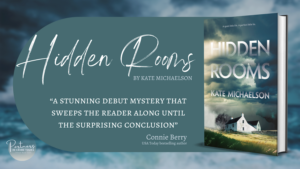
04/22 Review @ Paws. Read. Repeat
04/23 Review @ elaine_sapp65
04/24 Review @ Country Mamas With Kids
04/24 Showcase @ Books, Ramblings, and Tea
04/25 Guest post @ The Mystery of Writing
04/25 Review @ 5 Minutes for Books
04/26 Review @ Because I said so
04/27 Showcase @ Silvers Reviews
04/28 Review @ Pat Fayo reviews
04/29 Review @ Archaeolibrarian – I Dig Good Books!
04/30 Review @ ashmanda. k
05/01 Review @ mokwip8991
05/02 Review @ Catreader18
05/02 Showcase @ Celticladys Reviews
05/03 Review @ Novels Alive
05/04 Review @ The AR Critique
05/06 Review @ bookwormbecky1969
05/07 Interview @ Hott Books
05/08 Review @ Wall-to-wall Books
05/09 Review @ Dogs, Mysteries, & More
05/09 Showcase @ 411 ON BOOKS, AUTHORS, AND PUBLISHING NEWS
05/10 Review @ Book Reviews From an Avid Reader
05/11 Review @ Guatemala Paula Loves to Read
05/12 Review @ Mystery, Thrillers, and Suspense
05/12 Review @ The Page Ladies
05/14 Review @ reviewsbyrudra
05/15 Review @ fuonlyknew
05/16 Review @ Why Not? Because I Said So Book Reviews
05/17 Review @ Melissa As Blog
05/17 Showcase @ Teatime and Books

The post Kate Michaelson: Debut Mystery Author appeared first on The Mystery of Writing.

